Ultimate List of 265 Research Topics for College Students

How often do you freeze up after receiving an assignment to write a research paper? We know how tough it can be, particularly in a flood of possible research topics for students. Choosing that one idea from plenty of research proposal topics for college students is the foremost step in any academic project.
Lack of inspiration? We made an ultimate list of research topics for college students. You will find art, biology, social science, education, and even more fun research topics for college students. Don’t scour the tons of outdated or dull topics anymore. A much better alternative would be to look at essay examples instead.
What’s more, we prepared three main steps to start converting the chosen topic into a successful research paper. Besides, we will dispel any uncertainty in research importance.

Is Research Important?
- Art Research Topics
- Biology Research Topics
- Educational Topics
- Environmental Topics
Gender Research Topics
- Law Research Topics
Literature Research Topics
- Music Research Topics
- Psychology Topics
- Religion Research Topics
- Science Research Topics
- Social Science Topics
Sports Research Paper Topics
How to start a research paper, top 10 research topics for college students:.
- Human impact on biodiversity loss
- Internet’s effect on freedom of speech
- Is isolation a cause of child abuse?
- Negative effect of pop culture trends on youth
- Pros and cons of free education
- Is AI a threat to humans?
- The impact of modern technology on ecology
- Can nuclear power be safe?
- Economic impact of GMO food
- Negative effect of climate change on economy
Before getting into the importance of research, let’s understand what kind of work it is.
Research is an analysis aimed at discovering of new facts or revising existing theories. It consists of several steps. The most common are:
- Research methodology setting
- Research problem statement
- Data extraction and gathering
- Assessment of the gathered data
- Conclusions summarizing
What Are the Purposes of Research?
The intentions are countless, but here are the general ones:
✨ to accept or reject a hypothesis; ✨ to gather information on a phenomenon or subject; ✨ to initiate further research or to “dig deeper.”
Why Is It important?
Research makes our life easier. The underlying cause of new discoveries is to understand how things work. If we acquire that data, we’ll know how to get practical value out of it.
Think of Maslow’s hierarchy of needs. As we meet our deficiency needs, its level grows. At the same time, the demand for new knowledge increases. That is why discovering new is a never-ending process.
That is all clear. But you may ask: why do I need research skills in my day-to-day life?
After graduation, you will most likely still need research skills at work. No matter what the industry is. Either you decided to excel in science or form a hi-tech startup. If you want to achieve success, you should have strong research skills.
All in all, having research skills is one of the core elements of personal and social growth. It helps to generate additional findings or set new questions around existing knowledge.
Now let’s move on to the list of research topics.
Art Research Paper Topics
We’ll start from the study area, which is difficult to measure. We talk about art. For some, it may seem easier to study than exact sciences. But still, the number of questions about various genres, forms, and art styles is beyond imagination.
Why should we not overestimate the importance of studying art ?
Art is not just something for connoisseurs. It has always been and still is vital for the whole of society. What affected humanity’s development? Of course, the way people express their everyday life or feelings through art.
Besides, thanks to art, we can see things from different perspectives. It makes us open-minded and helps to develop critical thinking. And, most apparently, art fills our lives with beauty and elegance.
Art is so diverse that students may struggle to choose from a myriad of research areas. Here are some of the hottest art research paper topics for you:
- The influence of the internet and social networks on art.
- Researching of Greek mythological painting .
- The comparison of modern art in the United States and Europe.
- The representation of art in Lars von Trier’s films.
- The influence of African-American cultural heritage on modern American art.
- What are the features of contemporary art ?
- Frida Khalo and her sources of inspiration.
- The role of Kazimir Malevich in abstract art development.
- Art in the early renaissance and today’s European society .
- Art therapy techniques: what are they and are they effective?
- The difference of women’s representation in ancient and modern art .
- Comparative analysis of modern and classic cubism .
- The history and main features of abstract expressionism .
- The relationship between art and globalization .
- The influence of art on the fashion industry in Japan.
Biology Research Topics for College Students
Let’s move on to biology. This science deals with vital processes of living organisms. We’ve gathered a list of topics from different biology fields. You’ll find essay ideas from the fields of botany and zoology to genetics.
Research in biology has one distinctive feature. It is the use of research lab equipment. If you don’t use it and base your research on other sources — make sure they are credible.
What are the attributes of a research paper in biology?
Molecular biology, cellular, and other categories of biology imply accurate measurements. There is no place for mistakes here. Otherwise, the relevance of research results would be insignificant. A researcher should be scrupulous in calculations and statements.
So, feel free to pick up any topics from the list below. Study them thoroughly!
- The impact of global warming on marine life.
- Extensive research of photosynthesis aspects and functions.
- Thyroid hormones and their impact on the female body.
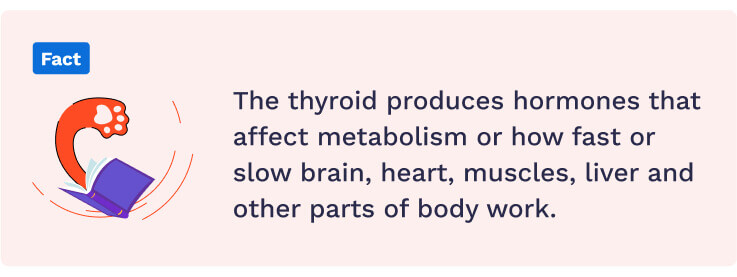
- DNA structure, modifications, and genetic disorders .
- Is it ethical to test cosmetics on animals ?
- The ability of living organisms to adapt to changing environments.
- The need for the protection of rare and endangered species .
- The role of sustainability in biology.
- Advantages and disadvantages of organic farming .
- The role of neurobiology in artificial intelligence development.
- The discovery and impact of Darwin’s theory .
- The discovery, history, and importance of vaccination .
- The role of microbes and microbiology in health .
- Neurobiology and its association with emotional trauma .
- Biology: mechanical signals regulating development .
- Cultural variations in environment and biology: AIDS .
- A review of the ecology and biology of the whale shark.
- Performance and quality assessment of methods for detection of point mutations.
- Optical imaging techniques in cell biology .
- Computational methods in molecular biology .
Educational Research Topics for Students
What can be trickier than studying how to study? Education research papers evolve at a rapid pace as the world changes every day. That is why new techniques and approaches are in demand.
No other discipline will answer the milestone questions as well as education. And the most important is about human nature.
What can make a precious contribution to society? The definite answer is — driving innovations in studying .
Want to remain in history as an author of a revolutionary breakthrough? Explore educational research paper topics for college students:
- Language distribution issues in bilingual schooling .
- Critical thinking as the primary goal of the educational process.
- Role-playing games as a learning tool .
- Pay-for-performance scheme for teachers .
- Moving from compliance to performance-based schools .
- Bilingual learning: advantages and disadvantages.
- Educational approaches in retrospective.
- Aspects of multicultural educational practices.
- The importance of inclusivity in teaching .
- Popular modern educational techniques: a comparison.
- Arithmetical problem-solving difficulties .
- Learning methods for blind children.
- The role of technology in lesson planning .
- Role-playing as an educational practice.
- The need for parents’ involvement in the educational process.
- Tools to develop the best teaching strategy .
- The efficiency of gamification .
- Individual approach to students.
- Popular educational mobile apps.
- Peculiarities of teaching disabled children .
- Same-gender and mixed-gender schools: a comparative analysis.
- Understanding the causes of school violence and bullying.
- The importance of sex education at schools.
- The educational system in America : problems and prospects.
- Cloud computing in educational institutions: an impact on the educational environment.
- Ethical behavior in higher educational institutions.
- Cooperation of educational institutions and businesses: successful cases.
- Information technology as a means of educational process improvement.
- Homeschooling and its influence on communication skills.
- Comparative analysis of distance learning and face-to-face education efficiency.
- Individualized versus group learning.
- The necessity of higher education for all students.
- Best practices of top higher education establishments.
- Peculiarities of teacher’s education in America.
- Preschool education versus tertiary education .
- Teacher as a researcher. Cross-age peer tutoring .
- Multicultural and monocultural education programs: a comparison.
- Comparison of advantages and disadvantages of tablets and printed textbooks .
- Should education be free?
- Education unification: reasons to apply in high schools.
Environmental Research Topics
Our day-to-day comfort is an inherent cause of environmental problems. We may drive a car and have no idea how we harm nature.
Eco activism is a growing trend. Ecology issues acquired a more frequent and lucid coverage. Regardless, people tend to overlook the environment. They got the idea that we should protect our planet, but not all of them are ready to act.
That is why we need to be aware of more facts and measures. This can’t be obtained without decent environmental science research papers.
Do you want to be a part of it? Use our list of environmental research topics for college students:
- Risks of climate change and global warming .
- Aspects and perspectives of Kyoto protocol .
- Green hydrogen in automotive industry : is it a great alternative?
- The origin of the carbon tax .
- Amazonian deforestation , its causes, and trends.
- The greenhouse effect : process, components, and risks.
- Types of pollution : air, water, and soil.
- Alternative energy in Europe.
- Water scarcity in the Middle East .
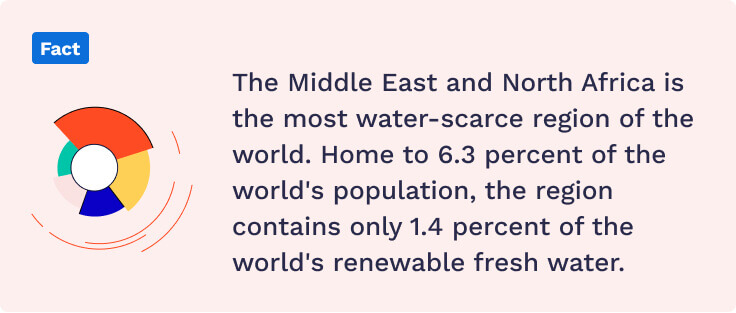
- Wind energy as an alternative source .
- Benefits of sustainable technology and living .
- Vulnerability of hazardville to flooding disasters .
- Environment protection authority and chemical waste .
- Population control in China.
- Geoengineering principles.
- Acid rains : the cause and current measures.
- Radioactive waste disposal.
- The protection of wildlife .
- E-mobility as an environmental protection measure.
- Ecological conservation.
Gender roles and aspects are one of the central social questions nowadays. Studies in this field are as relevant and necessary as never before. It pushes our society forward, eliminating gender inequality and discrimination.
Do you want to contribute to gender knowledge but don’t know where to start? Here is the list of most relevant gender studies essay topics:
- Public policy analysis on gender inequality in education in South Sudan.
- The history of gender concept.
- Gender imbalance in the developing countries.
- Sex reassignment in treating gender dysphoria : a way to psychological well-being.
- Employee issues: gender discrimination, sexual harassment , discrimination.
- Gender roles in couples and sex stereotypes in society.
- The diversity of gender and sexual orientation identities of transgender individuals.
- MeToo movement as sexual harassment fight measure.
- Feminism : the contraception movement in Canada.
- Maternity and paternity leaves .
- The correlation between gender and cognitive abilities .
- Transgender people and healthcare barriers .
- Race and gender in public relations .
- Gender stereotyping in American media .
- The health and well-being of LGBTQA+ young people in Australia.
- Cancel culture in America.
- Transgender healthcare issues .
- Transgender person in professional sports.
- Female genital mutilation.
- Gender roles in media.
Law Research Paper Topics
We cannot imagine a civilized society without law. Even though the fundamental rights and obligations in different countries are mostly similar, there is still a great scope of differences to research.
We gathered the list of law research paper topics to explore:
- Human rights violations in CIS countries.
- A self-enforcing model of corporate law .
- Corporate strategies and environmental regulations : organizing framework.
- The benefits of decriminalization .
- International criminal law and measures .
- Discrimination in the workplace in legal practice.
- Welfare legislation for families.
- Intellectual property law: copyright law, trademark law, patent law.
- Enforcement of civil rights law in private workplaces.
- The establishment of foreign and international law in American courts. A procedural overview.
- Family law : spousal support after a divorce in Canada.
- Employment law and workplace relations in Saudi Arabia.
- Applicable real estate laws and policies for sustainable development in South Africa.
- Retrospective of the immigration crisis in Europe.
- The need for a domestic violence law in Russian Federation.
- Religious crimes and religious laws.
- Terrorism in different countries’ law systems.
- Grievance procedure in the European court of human rights.
- Cybercrimes in legal practice.
- Human trafficking and slavery in the modern world.
When it comes to literature, there is a vast ocean of ideas to research. The topics can be classified into a large number of categories. Those can be literature genres, awards, trends in literature, different social aspects of literature, etc.
To make finding the best fit easier, we conducted a list of the world literature research topics:
- Golden Age writers and their impact on literature.
- Feminist literature authors.
- Y. Zamyatin’s “We” as the origin of dystopian literature.
- Trends of modern literature .
- Ancient Greece literature.
- Is best seller always good literature?
- Tricksters in literature.
- Post-modernism in literature .
- Sexual violence in the “Handmaid’s Tale” by Atwood .
- Children literature.
- The works of J. D. Salinger .
- Social perception of modern literature .
- Philosophy, literature, and religion in society: a comparative analysis of the impact on human life.
- The portrayal of racism in the literature of the 21st century.
- Censorship in literature.
- Professional literature trends.
- Central themes in American literature .
- The impact of digitalization on literature.
- The role of the main character in literature.
- Literature: print versus digitalized?
Music Research Paper Topics
Research is something we can do not only in astronomy or molecular biology. We need it in the music too. Music shapes our life in a way we can’t even imagine. It’s a tremendous social and cultural phenomenon to explore.
These are 20 potential topics for your research in the music industry :
- The effect of music on a human brain .
- The evolution of rap music .
- TikTok as the most efficient promotional channel for new music.
- The origin of music theory.
- The music industry and information technology .
- The influence of Kanye West performances on the music industry.
- Music journalism : the most influential music media.
- Feminism and sex in hip-hop music .
- Opera and instrumental music .
- The origin of music festivals .
- Reggae music and its aspects .
- Latin American women and trap music .
- Streaming services prospects.
- Music as the way of promoting new trends.
- Features of punk music.
Psychology Research Paper Topics
Psychology is a multidisciplinary kind of field. That means there’s a wide range of potential research questions.
Do you need to write a psychology paper? Explore the list of possible topics:
- Cross-cultural psychology: research and application.
- The psychology of self-esteem .
- Aspects of industrial and organizational psychology .
- The psychology of learning and motivation : skill and strategy in memory use.
- Description of remarkable experiments and their results in psychology.
- The influence of meditation on people’s health .
- Analyzing psychological disorders: disorders treatment and research .
- Personality psychology and zen Buddhism .
- Perception of psychology in society .
- Organizational behavior. Emotion and personality .
- Children’s emotional development .
- Predictors of postpartum depression .
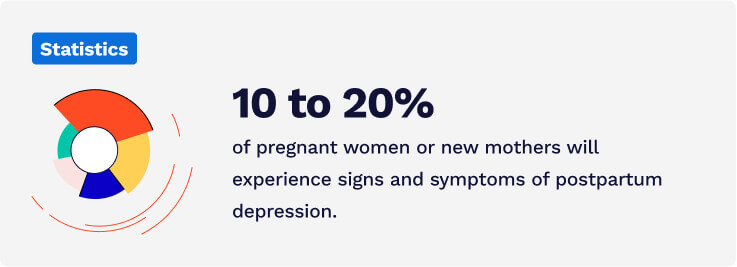
- Symptoms, causes, and treatment of schizophrenia.
- The social, political, and religious reasons of homophobia .
- Eating disorders in males: current progress and challenges.
- The side effects of antidepressants .
- Cognitive psychology : best cognitive scientists’ practices.
- Social anxiety as a constraint in learning.
- Alzheimer’s disease : working strategies for disease modification.
- The relation between the aging process and psychology.
Religion Research Paper Topics
Religious institutions, beliefs, and customs also get explored in papers quite often. That is rather a controversial sphere of education, so we gathered the most relevant religion paper topics below to help you.
- The religious significance of the Bible .
- The place of women in Islam .
- The history of Christianity in Indonesia .
- Assessing a crisis of faith and making a pastoral crisis intervention.
- Forced religion: cause and effect on children.
- The problem of creation mythology in the study of Indian religion.
- Existence of God : a philosophical introduction.
- Religion and mythology: concepts, differences.
- The role of religion in attitudes toward LGBT individuals.
- Issues and traditions in western religion .
- Theology in the concepts of nature, time, and the future.
- Religion and government interaction in the US.
- The history of the Christian church in East Europe.
- Religion freedom and its limitation .
- Hinduism and Buddhism: similarities and differences .
- Baptism in Christianity .
- The impact of religion on terrorism .
- The God of Israel and Christian theology .
- Culture and religion: how they interact.
- Religion and social morality.
Science Research Topics for College Students
What is a better way to uncover the mysteries of our universe than through science? As it comprises multiple types and directions, there is a vast number of questions to answer.
We suggest you the following science research paper topics:
- Paris climate agreement perspectives.
- Ethical aspects of cloning .
- Political science in the US: past and present issues.
- Genetic engineering and cloning controversy .
- The development of life on Earth .
- The current state of nuclear energetics in America.
- Nuclear weapon -free zones: a history and assessment.
- Solid earth dynamics and the evolution of the Antarctic ice sheet.
- Natural hazards : local, national, global.
- Geophysical fluid dynamics: atmospheric dynamics, dynamo theory, and climate dynamics.
- Data science as a key element of data-driven decision-making.
- Robotics & mobility systems in agriculture: successful cases.
- Legal models of space resources exploration and utilization.
- The social context of recycling : factors influencing household recycling behavior.
- Trends in consumer attitudes about agricultural biotechnology .
- Theory of turbulence: a mathematical model that illustrates it.
- Dual-mode infrared and radar hardware-in-the-loop test equipment.
- Essentials of computational chemistry: theories and models.
- Genetic algorithms in astronomy and astrophysics.
- A fundamental relation between supermassive black holes and their host galaxies.
Social Science Research Topics
Sociology is an umbrella term that covers dozens of branches. It studies family, social movements, mass media, class theory, race, ethnicity, levels of income. We could go on and on.
As you can see, the options for research are endless. Don’t waste your time trying to understand the peculiarities of each social or cultural branch. Use our list of social science research paper topics for college students.
- Social movements of 21 st century.
- Strauss–howe generational theory in marketing.
- Social media as a “hotbed” of narcissism .
- The nutritional status of vegans and vegetarians .
- Gender identity and community among three transgender groups in the United States: MTFs, FTMs, and genderqueers.
- Social causes of anorexia in young women.
- The civil rights in South America.
- #BlackLivesMatter movement and its influence on society.
- Gay marriage in America : current debates.
- Dependency of the children mortality level on the anti-vaccination movement development.
- Judaism in the first centuries of the Christian era.
- School choice and segregation by race, class, and achievement.
- The correlation between race and wealth.
- Freedom and social status of blacks in America.
- The problem of abortion .
- Causes and effects of drug addiction .
- Horizontal and vertical gender segregation in employment .
- Effects of domestic violence on children .
- The poverty level in the US: a retrospective analysis.
- Women leadership and community development.
We are approaching the end of our ultimate research paper topics list. To wrap it up, let’s take a look at sports research ideas.
It has been present in our lives for a long time and is still developing. That’s why we need to answer new questions and build new knowledge. Explore the list below:
- How does globalization affect sports?
- History of doping scandals in the Olympics .
- Team sports as a socialization tool for children.
- The origin and history of ice hockey.
- Organizational aspects of Paralympic games.
- Aspects of independent Olympians at the Olympic games .
- The unique history of Pelé.
- Risk factors for injuries in football.
- Short interval versus long interval training.
- Sport as a communication medium .
- Nutritional support of young athletes .
- Mental training during competition preparation.
- Philosophical conflicts between the practices of sport and cybersport.
- Running as a treatment for heart diseases .
- Typical traumas of soccer players.
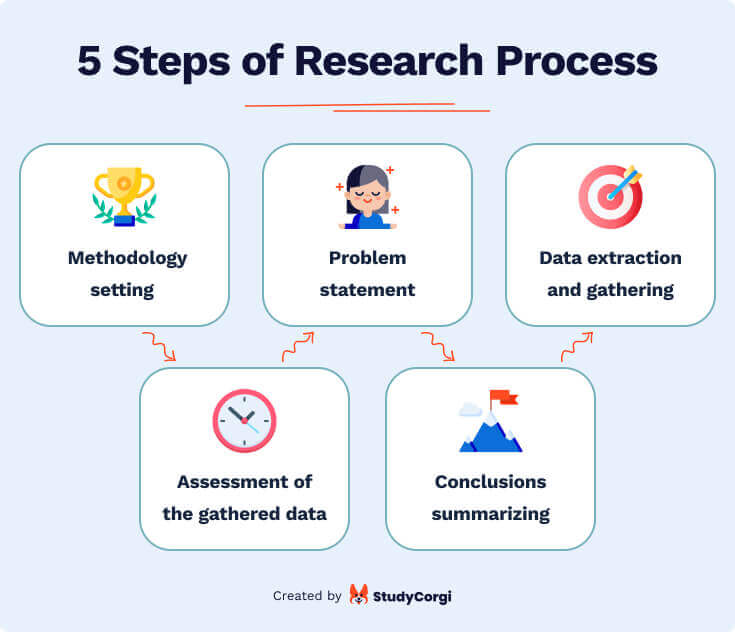
After getting familiar with the list of topics, let’s discuss the essential steps before beginning research.
Narrow Your Topic
Let’s say you selected that one topic from the list. What’s next? It’s time to outline the boundaries of the research. It should not be too broad or narrow . Its scope must strictly correspond to the problem’s scope under exploration.
What is the difference between a narrow and a broad topic?
Let’s look at three research topic examples:
- Eating Disorders. The topic is too general and comprehensive. If your research paper requires to be short, then there is no sense in choosing this topic. You better narrow it down.
- Eating Disorders in Young Females. In this topic, we try to segment the subjected populations to specify the research question. It is still rather broad but more focused.
- Anorexia in Young Females and Its Impact on Society. Here, we distinguish a particular type of eating disorder and leave a population segmentation. That is a perfect example of a narrowed topic. Now, it’s easier to ask specific questions, uncover insights and contribute to further research.
Focus on your narrowed topic and form a central research question. After that, research the existing data and find supporting facts. Don’t let your exploration be one-sided: explore different points of view. Compare and analyze counterpoints and draw conclusions.
After a profound studying, create a thesis statement to support your narrowed topic in a specific way.
To make things clear, use this step-by-step guide on finding and narrowing your topic.
Evaluate Sources
It takes a second to get access to billions of search results on any topic in Google. Most of the time, we jump through the first two or three links, and that’s it. If you seek quality, then it’s not the proper approach. You should acquire the skill of processing the sources.
What are the tips for source evaluation?
- Forget about Wikipedia as a scientific source. Wikipedia is a free platform where any user can make edits. Extracting information from wiki without fact-checking isn’t a good academic practice. Great alternatives to Wikipedia are College e-libraries, scholarly databases, Google Scholar, etc.
- Explore well-respected professional research journals. They contain up-to-date research data and conclusions which shape the most relevant views and understanding of what is going on in the modern world.
- Visit libraries. We tend to overlook them in our digital era. But you can find super valuable sources for research there.
- Avoid personal blogs, opinion articles, and self-published books . There can be heavy use of bias.
3 Main Tips on Writing a Thesis Statement
After you decide on a research topic and sources, it’s time to write a thesis statement.
- Ask a question. Here are two options. In the first one, your professor can assign you a concrete question. If it’s not your case, then ask what interests you. What would you like to explore?
- Give an initial answer. Try to answer the question before in-depth topic exploration. Work out some hypotheses.
- Enrich the initial answer. Prove the initial hypothesis by detailing the research. Use the calculations and quantitative data to make your thesis credible.
To back up these tips, let’s look at a couple of example thesis statements from the StudyCorgi essay database:
You’ve just explored an ultimate list of research paper topic ideas and important steps to turn those topics into excellent research papers.
Did you find our topics compilation helpful? Save it for a future reference or share with friends!
- Definition of Research — Western Sydney University
- The Importance of Research to Students — Cleveland University Kansas City
- Guidelines for Writing Art History Research Papers — UA Little Rock University
- Areas of Research in Biology — Massachusetts Institute of Technology
- Environmental Science: Current Research — Herald Scholarly Open Access
- Thesis Statements — University of North Carolina
- Thesis Statement Tips — Purdue University
- What Is Education Research — National Center for Education Research
- Research in the Faculty of Music — University of Cambridge
- Research: Religion and Society Specialism — University of Birmingham
- Sociology Research Areas — Cornell University
- Narrowing a Topic Idea — UCS Libraries
- Developing a Research Question — The University of Arizona
- Organizing Academic Research Paper — Sacred Heart University
- How to Write a Conclusion for a Research Paper: Indeed
Celebrating 150 years of Harvard Summer School. Learn about our history.
Top 10 Study Tips to Study Like a Harvard Student
Adjusting to a demanding college workload might be a challenge, but these 10 study tips can help you stay prepared and focused.
Lian Parsons
The introduction to a new college curriculum can seem overwhelming, but optimizing your study habits can boost your confidence and success both in and out of the classroom.
Transitioning from high school to the rigor of college studies can be overwhelming for many students, and finding the best way to study with a new course load can seem like a daunting process.
Effective study methods work because they engage multiple ways of learning. As Jessie Schwab, psychologist and preceptor at the Harvard College Writing Program, points out, we tend to misjudge our own learning. Being able to recite memorized information is not the same as actually retaining it.
“One thing we know from decades of cognitive science research is that learners are often bad judges of their own learning,” says Schwab. “Memorization seems like learning, but in reality, we probably haven’t deeply processed that information enough for us to remember it days—or even hours—later.”
Planning ahead and finding support along the way are essential to your success in college. This blog will offer study tips and strategies to help you survive (and thrive!) in your first college class.
1. Don’t Cram!
It might be tempting to leave all your studying for that big exam up until the last minute, but research suggests that cramming does not improve longer term learning.
Students may perform well on a test for which they’ve crammed, but that doesn’t mean they’ve truly learned the material, says an article from the American Psychological Association . Instead of cramming, studies have shown that studying with the goal of long-term retention is best for learning overall.
2. Plan Ahead—and Stick To It!
Having a study plan with set goals can help you feel more prepared and can give you a roadmap to follow. Schwab said procrastination is one mistake that students often make when transitioning to a university-level course load.
“Oftentimes, students are used to less intensive workloads in high school, so one of my biggest pieces of advice is don’t cram,” says Schwab. “Set yourself a study schedule ahead of time and stick to it.”
3. Ask for Help
You don’t have to struggle through difficult material on your own. Many students are not used to seeking help while in high school, but seeking extra support is common in college.
As our guide to pursuing a biology major explains, “Be proactive about identifying areas where you need assistance and seek out that assistance immediately. The longer you wait, the more difficult it becomes to catch up.”
There are multiple resources to help you, including your professors, tutors, and fellow classmates. Harvard’s Academic Resource Center offers academic coaching, workshops, peer tutoring, and accountability hours for students to keep you on track.
4. Use the Buddy System
Your fellow students are likely going through the same struggles that you are. Reach out to classmates and form a study group to go over material together, brainstorm, and to support each other through challenges.
Having other people to study with means you can explain the material to one another, quiz each other, and build a network you can rely on throughout the rest of the class—and beyond.
5. Find Your Learning Style
It might take a bit of time (and trial and error!) to figure out what study methods work best for you. There are a variety of ways to test your knowledge beyond simply reviewing your notes or flashcards.
Schwab recommends trying different strategies through the process of metacognition. Metacognition involves thinking about your own cognitive processes and can help you figure out what study methods are most effective for you.
Schwab suggests practicing the following steps:
- Before you start to read a new chapter or watch a lecture, review what you already know about the topic and what you’re expecting to learn.
- As you read or listen, take additional notes about new information, such as related topics the material reminds you of or potential connections to other courses. Also note down questions you have.
- Afterward, try to summarize what you’ve learned and seek out answers to your remaining questions.
Explore summer courses for high school students.
6. Take Breaks
The brain can only absorb so much information at a time. According to the National Institutes of Health , research has shown that taking breaks in between study sessions boosts retention.
Studies have shown that wakeful rest plays just as important a role as practice in learning a new skill. Rest allows our brains to compress and consolidate memories of what we just practiced.
Make sure that you are allowing enough time, relaxation, and sleep between study sessions so your brain will be refreshed and ready to accept new information.
7. Cultivate a Productive Space
Where you study can be just as important as how you study.
Find a space that is free of distractions and has all the materials and supplies you need on hand. Eat a snack and have a water bottle close by so you’re properly fueled for your study session.
8. Reward Yourself
Studying can be mentally and emotionally exhausting and keeping your stamina up can be challenging.
Studies have shown that giving yourself a reward during your work can increase the enjoyment and interest in a given task.
According to an article for Science Daily , studies have shown small rewards throughout the process can help keep up motivation, rather than saving it all until the end.
Next time you finish a particularly challenging study session, treat yourself to an ice cream or an episode of your favorite show.
9. Review, Review, Review
Practicing the information you’ve learned is the best way to retain information.
Researchers Elizabeth and Robert Bjork have argued that “desirable difficulties” can enhance learning. For example, testing yourself with flashcards is a more difficult process than simply reading a textbook, but will lead to better long-term learning.
“One common analogy is weightlifting—you have to actually “exercise those muscles” in order to ultimately strengthen your memories,” adds Schwab.
10. Set Specific Goals
Setting specific goals along the way of your studying journey can show how much progress you’ve made. Psychology Today recommends using the SMART method:
- Specific: Set specific goals with an actionable plan, such as “I will study every day between 2 and 4 p.m. at the library.”
- Measurable: Plan to study a certain number of hours or raise your exam score by a certain percent to give you a measurable benchmark.
- Realistic: It’s important that your goals be realistic so you don’t get discouraged. For example, if you currently study two hours per week, increase the time you spend to three or four hours rather than 10.
- Time-specific: Keep your goals consistent with your academic calendar and your other responsibilities.
Using a handful of these study tips can ensure that you’re getting the most out of the material in your classes and help set you up for success for the rest of your academic career and beyond.
Learn more about our summer programs for high school students.
About the Author
Lian Parsons is a Boston-based writer and journalist. She is currently a digital content producer at Harvard’s Division of Continuing Education. Her bylines can be found at the Harvard Gazette, Boston Art Review, Radcliffe Magazine, Experience Magazine, and iPondr.
Becoming Independent: Skills You’ll Need to Survive Your First Year at College
Are you ready? Here are a few ideas on what it takes to flourish on campus.
Harvard Division of Continuing Education
The Division of Continuing Education (DCE) at Harvard University is dedicated to bringing rigorous academics and innovative teaching capabilities to those seeking to improve their lives through education. We make Harvard education accessible to lifelong learners from high school to retirement.

Top 10 Research Topics For Students In 2024
Link Copied
Share on Facebook
Share on Twitter
Share on LinkedIn
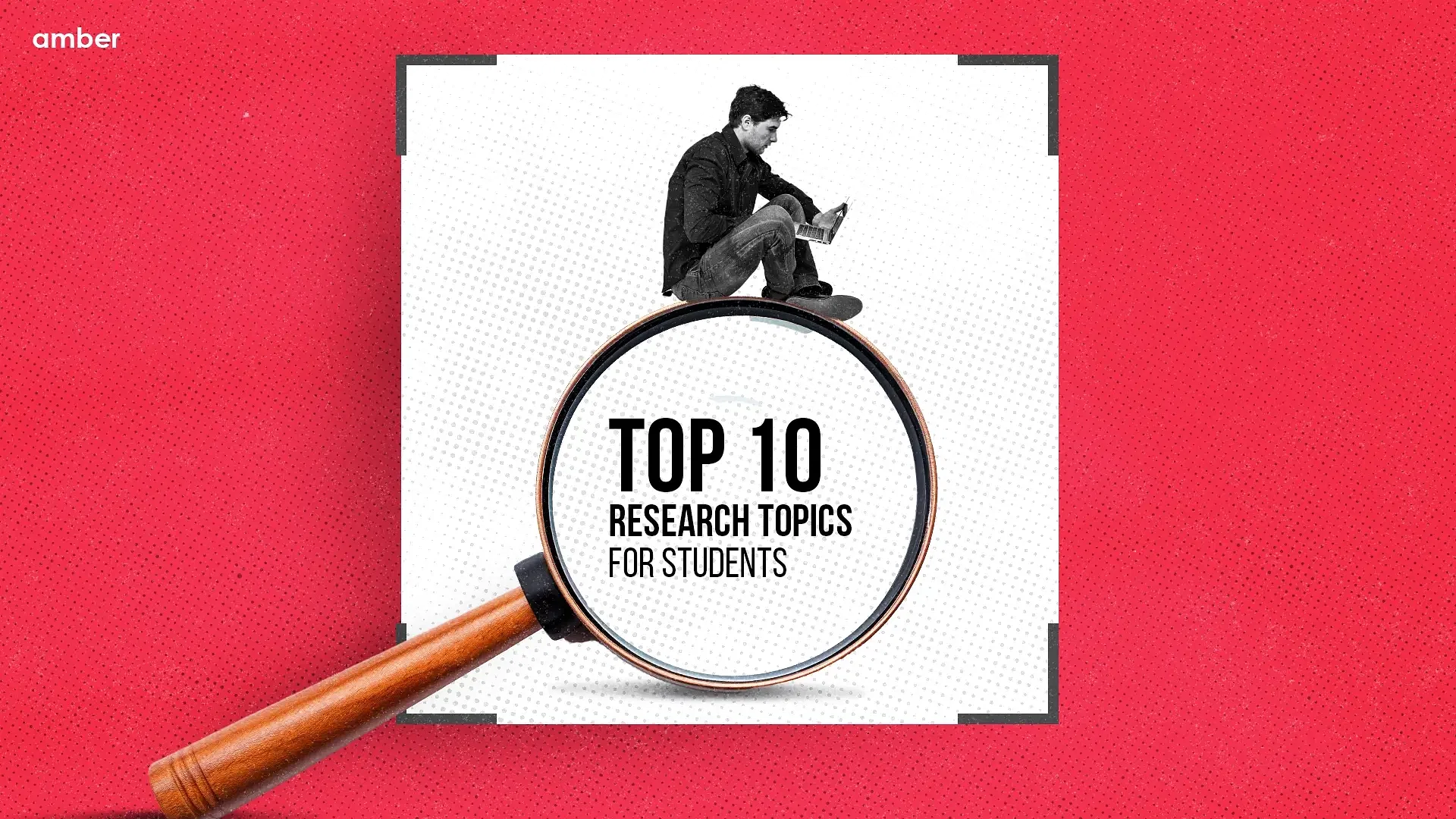
Research Beyond the Obvious!
Are you struggling to find a topic that can unearth new findings? Even before starting, many students feel drowning with the mere task of sorting out the best research topics. Don’t sweat it! This blog explores the top 10 research topics for students, with a focus on different subjects, including psychology, social sciences, etc. From exploring the impact of AI to dealing with social issues, let’s discover good ideas for a research paper!
Why Do You Need to Find a Research Topic?
Before we get down to the top 10 research topics on student learning , let’s understand what they are. Research topics help students to drill down into a subject and break down a wide aspect into smaller things. The topics serve the purpose of bringing fresh perspectives to the table and point out a potential knowledge gap or core problem.
Research Topic vs. Research Question
Going by its definition, a research topic focuses on a broad theme that calls for deep investigation. On the other hand, a research question is a particular query that researchers use to find plausible answers and new scopes. While you may be busy finding the top 10 research topics for students in college or senior high school, always remember that the topic reflects an aspect of a subject.
How To Find Research Topics To Write About
The key to finding the top 10 research topics may leave you confused but don’t worry. The table below portrays the characteristics of interesting research paper topics that you must keep in mind:
What Makes a Good Research Topic
While we will give you some ideas about the top 10 research topics for students, you still need to pick one. However, getting closer to this topic may feel soul-crushing! Don’t worry; these tips will help you select good research project topics for students.
1. Focus on Personal Interests
Research paper topics for college students usually stem from what motivates them. If you are interested in a specific field, you can go forward with the topic as long as it is relevant to your field. However, this does not mean you can overlook potential biases - being too close to the subject might even lead you nowhere.
Unlock Your Future with Amberscholar Today!
2. check the guidelines.
When looking for the top 10 research topics for students, it’s imperative to adhere to guidelines laid out by your school. Sometimes, they approve good topics for research papers only if they are related to the public interest or environment. Ask your professor/mentor whether you need to follow certain guidelines while finding the best research titles for students.
3. Availability of Resources
Your research project might never see the daylight if you do not have enough resources available. Make sure the resources are within your limits! In case your research has funding, always check how you will be able to use it. Finances, access to participants, and timings are key factors in finalising among the top 10 research topics for students.

Top 10 Research Topics for Students in College and Senior High School
Here, we will delve into the top 10 research topics for students. Whether you are in a college or senior high school, these topics will show you light at the end of the tunnel. You might find inspiration from these topics and may even come up with original research topics and research questions. So, let’s unveil the best research topic ideas for students!
1. Psychology Research Paper Topics
Psychology papers offer an exciting opportunity to explore and understand the human psyche. Emerging technologies and their impact on mental health is one of the best research topics for college students, yet there is more you can explore. Below are some of the best research topics for college students:
1. The impact of social media on mental health among adolescents and young adults.
2. The potential benefits and risks of virtual reality therapy for mental health conditions.
3. The ethical considerations of using AI in psychological treatment.
4. The influence of mindfulness practices on cognitive performance and well-being.
5. The link between sleep quality and cognitive decline in ageing populations.
2. Business and Economics Research Topics
From sustainable business practices to global trade dynamics, the best research topics for college students regarding business and economics revolve around many areas. While you may initially find it challenging how to conduct research , you can draw inspiration from these topics for research paper:
1. The impact of AI on various aspects of business, such as marketing and financial analysis. 2. The ethical considerations and challenges associated with the use of big data and analytics in business practices. 3. The potential of blockchain technology to revolutionise supply chain management and improve data privacy. 4. The effectiveness of policy interventions to promote sustainable economic growth & development. 5. Exploring the factors that contribute to the success of startups and new ventures in the digital age.
While you find research topics, discover the best accommodation too!
Register with amber today!
3. Social Sciences Research Topics
Social sciences deal with the study of human behaviour and explore socioeconomic inequalities, political ideologies, urban development, and more. If you are looking for good ideas for a research paper regarding social sciences, here are some:
1. The effectiveness of different social policy interventions aimed at addressing global issues. 2. The potential of blockchain technology to improve transparency and accountability in social structures. 3. The social and ethical implications of artificial intelligence (AI) in various aspects of life. 4. The psychological and social impacts of climate change on individuals and communities. 5. The increasing focus on interdisciplinary research that combines social science with data science.
4. Language and Linguistics Research Topics
From computational linguistics to semantics to language preservation, the field of language leads to some really good topics for research papers. While going through our list of top 10 research topics for students, you can already grasp that there are a few things to keep in mind when writing a college paper ! So, here are the best research topic ideas for students regarding language studies:
1. The influence of social media and digital communication on language use and evolution. 2. The impact of language learning apps and online platforms on pedagogy. 3. The role of language in perpetuating social inequalities. 4. The link between language and mental health in the context of cultural displacement. 5. The potential of multilingualism to enhance cognitive abilities.
5. Health and Medicine Research Topics
Finding the best research title ideas for students is daunting when it comes to a dynamic field like health and medicine. After going through this compilation of the top 10 research topics for students, you can understand how to come up with the right one. Here, based on the emerging areas of interest, we share some of the potentially impactful and the best research ideas for students:
1. The integration of AI in medical diagnosis and treatment. 2. Investigating the ethical considerations of using AI in the healthcare sector. 3. The developing field of preventive health measures and promoting healthy lifestyles. 4. The link between social determinants of health and mental well-being. 5. Improving access to healthcare and promoting health equity in minority communities.
6. Renewable Energy & Clean Technologies Research Topics
Initially, you might find it impossible to understand how to write a research paper for college , but these top 10 research topics for students will have you covered. Especially when your focus is on clean energy sources and the emission of greenhouse gases, there is a lot to cover nowadays. Here are some of the best research topics for students:
1. The potential of next-generation solar cell technologies. 2. The social and environmental aspects of renewable energy deployment. 3. Discovering the potential of decentralised energy systems. 4. The potential of hydrogen energy, including production, storage, and utilisation. 5. The impact of climate change on renewable energy resources.
7. Technology and Innovation Research Topics
The sector for technology is ever-evolving, with innovations taking place every other. With the emergence of IoT, artificial intelligence, and ML, the world of technology is your oyster. Here are the best research topics for students:
1. The societal implications of AI in healthcare, finance, and autonomous vehicles. 2. The potential of blockchain technology to revolutionise cybersecurity and voting systems. 3. Innovative solutions to combat climate change, including renewable energy technologies and sustainable infrastructure. 4. The role of technology in disaster preparedness and risk management. 5. The use of technology to bridge the digital divide and ensure equitable access to information.
8. Arts and Design Research Topics
Whether your niche lies in art therapy, cultural studies in arts, or architecture innovation, there are interesting research paper topics. While exploring the top 10 research topics for students, constructing research may seem difficult – going through the research design - elements and characteristics can solve your problems. So, here are the best research topics for students in college:
1. The impact of AI on artistic creation. 2. The use of virtual reality and augmented reality in storytelling. 3. The role of art in addressing social and environmental challenges. 4. The use of art as a tool for social commentary and activism. 5. The evolving nature of art museums and galleries in the digital age.
9. Argumentative Research Topics
Building a specific argument and exploring topics can bring you some unique topics for research paper. Through these top 10 research topics for students, you can evaluate human interest on a global scale and beyond. Let’s have a look at these best research topics for students:
1. Is universal basic income a viable solution to poverty? 2. Is nuclear power a solution to the global energy crisis? 3. Does increased global cooperation offer a solution to climate change? 4. The impact of automation and AI on the future of work and employment. 5. The ethical implications of gene editing and other emerging biotechnologies.
10. Human Rights Research Paper Topics
Our list of top 10 research topics remains incomplete without human rights. This field is evolving and has become a growing interest for everyone around the world. If you want to probe questions about gender equality or privacy rights, here are a few of the research title examples for students:
1. The role of human rights defenders and activists in promoting social change. 2. The human rights of marginalised groups, such as LGBTQ+ individuals and people with disabilities. 3. The impact of AI on human rights, including issues of bias and discrimination. 4. Examining the ethical implications of facial recognition technology. 5. Exploring the human rights implications of environmental pollution and toxic waste disposal.
Now that you have an idea about some of the top 10 research topics for students, we hope you come up with an original one. Remember, successful research always starts with the right question. Take time, dig deep into the relevant theories, and find thought-provoking topics for research papers. Meanwhile, don’t overlook the power of how to write a research paper appendix and how to create the right structure for the paper. You can also check out amber+ for essential tools that can help make your thesis writing process smoother! So, happy researching! Also, dive into our exclusive visual guide to uncover intriguing research topics tailored for students like you.
Find the Ideal Student Space for Your Research
As you focus on your studies and research, don’t forget to find the perfect space to settle into. Discover our range of top modern, comfortable student accommodations that fit your lifestyle.
1. Collegiate Bagot Street, Birmingham 2. Collegiate Corporation Village, Coventry 3. Allied Students Edinburgh College Residence, Edinburgh 4. Collegiate Tower, Bristol 5. Project Students Ty Glyn, Bangor
Frequently Asked Questions
How can i get research ideas, what is a good research question, what constitutes a good research topic, how do i create a title for my research topic, what's the difference between a research topic and a research problem.
Your ideal student home & a flight ticket awaits
Follow us on :

Related Posts

A Guide to Getting an MBA in the USA

15 Best Education System in the World
.jpg)
Top 10 Must-Have Employability Skills For Students

amber © 2024. All rights reserved.
4.6/5 on Trustpilot
Rated as "Excellent" • 5000+ Reviews by students
Rated as "Excellent" • 5000+ Reviews by Students
10 Best Online Academic Research Tools and Resources
Every college student conducts research at some point. And professors have strong views on what counts as a credible academic resource. Choosing the wrong sources can hurt your grade.
So how can you conduct research efficiently while avoiding sleepless nights in the campus library? Online academic research tools make it easier to find reliable sources quickly.
Rather than pulling random facts from the internet — and running into problems with citations — college students need to know how to find credible sources and how to use online academic tools. Keep reading to learn how you can find the best credible sources for your college research needs.
Popular Online Programs
Learn about start dates, transferring credits, availability of financial aid, and more by contacting the universities below.
The 10 Best Academic Research Sources
What resources will point you toward reliable sources for your academic research? Rather than scrolling through pages of search results, turn to these academic resources when you need to find sources.
1. Google Scholar
Looking for an academic article, thesis , or abstract? Google Scholar should be your first stop. Google Scholar helps you find related works, locate full documents at your school library , and access scholarly research.
While Google created Google Scholar, it’s very different from a general online search. Google Scholar brings together academic articles and ranks them based on the authors, publication location, and citation record. That means the top results generally represent the most reliable scholarship on your topic.
For journal articles, books, images, and even primary sources, JSTOR ranks among the best online resources for academic research. JSTOR’s collection spans 75 disciplines, with strengths in the humanities and social sciences . The academic research database includes complete runs of over 2,800 journals.
And if you’re looking for images, turn to Artstor , which offers over 2.5 million images related to the arts, sciences, and literature. However, JSTOR is not an open-access database. That means you’ll need to log in through your university library, which typically includes off-campus access .
3. Library of Congress
As the largest library in the world, the Library of Congress is an amazing online resource for academic research. Students can search its collections to access digital resources, videos, audio recordings, photographs, and maps.
The library’s materials also include notated music, web archives, legislation, and 3D objects. You’ll find materials for almost any topic in its extensive collections. You can search historic American newspapers from 1777-1963 with the Chronicling America tool or look up pirate trials in another digital collection.
4. PubMed Central
The National Library of Medicine, part of the U.S. National Institutes of Health, runs PubMed Central. Founded in 2000, the database includes academic scholarship dating back to the 18th century. The resource connects college students with life sciences and biomedical academic sources.
And as an open-access database, PubMed Central offers free access to scholarly literature. Today, PubMed Central has over 7 million full-text records, making it a great resource for students in the life sciences or medical fields.
5. Google Books
Whether you’re looking for a recent publication or an out-of-print book, there’s a good chance you’ll find it on Google Books. In 2019, Google announced that Google Books contains over 40 million books .
You can enter any search term to find books that contain matches. And you can download the full text of any book in the public domain — which includes 10 million titles. Make sure to check publisher and author information when using Google Books.
The site also includes reference pages that link to book reviews. Keep in mind that you’ll have more limited access to recent books. Still, Google Books is a great first step to find sources that you can later look for at your campus library.
6. Science.gov
If you’re looking for scientific research, Science.gov is a great option. The site provides full-text documents, scientific data, and other resources from federally funded research.
A U.S. government site, Science.gov searches more than 60 databases and 2,200 scientific websites. You’ll find over 200 million pages of research and development information, including projects funded by 14 federal agencies. Students in any STEM field can benefit from the resource.
7. Digital Commons Network
University librarians curate the Digital Commons Network, which connects students with peer-reviewed articles. The site’s other resources include dissertations, book chapters, conference proceedings, and working papers.
The Digital Commons Network includes scholarly work from diverse disciplines like architecture, business, education, law, and the sciences. You can also access humanities, social sciences, and engineering scholarship through the network.
8. ResearchGate
ResearchGate has been described as social networking for research scientists. But ResearchGate is also a great option to find open-access academic sources. Scholars upload their work to ResearchGate, which makes it available to the public for free.
Currently, over 20 million researchers around the world use the site, which contains over 135 million publications. College students looking for scientific research can often find resources on ResearchGate and even connect with scholars.
9. WorldCat
When you’re looking for library resources, WorldCat is one of the best tools. Connected to over 10,000 libraries, WorldCat is a database that allows you to search library collections.
The database lists books and articles available at your local libraries, making it easier to find materials that are not available online. In addition to books, WorldCat contains music, videos, audiobooks, and scholarly articles.
You can also find digital research materials, including photos. When you’re logged into WorldCat through your university library, you can also access full-text articles and other resources. Or you can use WorldCat to find sources to request through interlibrary loan.
10. Your University Library
When you’re conducting academic research, your university library can be one of your best resources. In addition to online databases, journal articles, and books, your campus library also has academic librarians who can point you to the best sources.
When you don’t know where to start, reach out to an academic librarian to learn more about your school’s research tools. Or use interlibrary loan to get a scanned copy of an article. Many of the campus library’s resources are available online, making them easy to access.
How to Find Credible Sources for Research
How can you find credible sources for research and avoid misinformation? Your instructor likely recommends avoiding general web content or Wikipedia.
Finding the most reliable websites for research starts with evaluating the website itself. Sites run by academic or government organizations rank high in reliability. Databases and specialized search engines can also provide good research sources.
Next, make sure you understand the source of the information and the process used to publish it. Scholarly articles and books that undergo peer review make for the best academic resources.
Finally, when in doubt, check with your instructor or an academic librarian. They can help point you to reliable sources or double-check sources you’re unsure about.
How to Access Academic Resources
Many sites offer open-access resources. That means anyone can access the materials. Other sites restrict what you can read. For example, you might find some blank pages when searching on Google Books because of copyright restrictions. And many academic articles are behind paywalls.
Fortunately, college students benefit from one of the best resources for conducting research: the university library. Your library likely subscribes to multiple academic databases and journals. If you run into a paywall, check whether your library offers access to the resource.
Explore More College Resources

What Is a Research University?
Research universities invest in research and development. Learn more about R1 schools and the reasons to choose a research university.

by Genevieve Carlton, Ph.D.
Updated June 3, 2022

How to Write a Research Paper: 11-Step Guide
Writing a research paper can be challenging, not to mention time-consuming. Follow these 11 steps to write a stellar college research paper.

by Samantha Fecich, Ph.D.
Updated January 17, 2023


Strategies for Writing a Compelling Thesis Statement
The thesis is central to an argumentative essay. These strategies and thesis statement examples will teach you how to write a quality essay introduction.

by Staff Writers
Updated November 4, 2020
An official website of the United States government
Official websites use .gov A .gov website belongs to an official government organization in the United States.
Secure .gov websites use HTTPS A lock ( Lock Locked padlock icon ) or https:// means you've safely connected to the .gov website. Share sensitive information only on official, secure websites.
- Publications
- Account settings
- Advanced Search
- Journal List
Causes and consequences of sleepiness among college students
Shelley d hershner, ronald d chervin.
- Author information
- Article notes
- Copyright and License information
Correspondence: Shelley D Hershner, Department of Neurology, University of Michigan, Med Inn C728, 1500 East Medical Center Drive, Ann Arbor, MI, USA, Tel +1 734 936 6295, Fax +1 734 647 9065, Email [email protected]
Collection date 2014.
The full terms of the License are available at http://creativecommons.org/licenses/by-nc/3.0/ . Non-commercial uses of the work are permitted without any further permission from Dove Medical Press Limited, provided the work is properly attributed.
Daytime sleepiness, sleep deprivation, and irregular sleep schedules are highly prevalent among college students, as 50% report daytime sleepiness and 70% attain insufficient sleep. The consequences of sleep deprivation and daytime sleepiness are especially problematic to college students and can result in lower grade point averages, increased risk of academic failure, compromised learning, impaired mood, and increased risk of motor vehicle accidents. This article reviews the current prevalence of sleepiness and sleep deprivation among college students, contributing factors for sleep deprivation, and the role of sleep in learning and memory. The impact of sleep and sleep disorders on academics, grade point average, driving, and mood will be examined. Most importantly, effective and viable interventions to decrease sleepiness and sleep deprivation through sleep education classes, online programs, encouragement of naps, and adjustment of class time will be reviewed. This paper highlights that addressing sleep issues, which are not often considered as a risk factor for depression and academic failure, should be encouraged. Promotion of university and college policies and class schedules that encourage healthy and adequate sleep could have a significant impact on the sleep, learning, and health of college students. Future research to investigate effective and feasible interventions, which disseminate both sleep knowledge and encouragement of healthy sleep habits to college students in a time and cost effective manner, is a priority.
Keywords: grade point average, GPA, sleep deprivation, academic performance, adolescence, sleep education programs
Introduction
The college experience is of great value in providing emerging adults with a structured environment in which they can gain the knowledge, skills, and independence to chart their own path, become successfully employed, and contribute to society. However, this experience comes at great cost given rising tuition fees and ballooning student debt, and thus, it is vital that the college years be as efficacious as possible. A potential obstacle to maximizing success in college is the high prevalence of daytime sleepiness, sleep deprivation, and irregular sleep schedules among college students.
Daytime sleepiness is a major problem, exhibited by 50% of college students compared to 36% of adolescents and adults. 1 At least 3 days a week, 60% of students report that they are dragging, tired, or sleepy. 2 Sleepiness is defined as the inability or difficulty in maintaining alertness during the major wake period of the day, resulting in unintended lapses into drowsiness or sleep. 3 It is important to note that sleepiness is often circumstance-dependent, with many aspects of the students’ learning environment exacerbating sleepiness. 4 For example, a lecture that does not require active participation and may be in a dark, warm lecture hall can unmask underlying sleepiness. Sleep deprivation is defined as obtaining inadequate sleep to support adequate daytime alertness. 4 How much sleep a young adult needs is not clearly known, but is thought to be 8 hours. 5 , 6 Most college students are sleep deprived, as 70.6% of students report obtaining less than 8 hours of sleep. 7 The impact of educational major on sleepiness and sleep duration is not well studied, but the effect may be substantial. As reported at an Architecture School in the Midwest, only 4% of students obtained at least 7 hours of sleep at night; the average sleep duration was 5.7 hours, with 2.7 “all-nighters” per month. 8 Eighty-two percent of college students believe that inadequate sleep and sleepiness impact their school performance. 9 Students rank sleep problems second only to stress in factors that negatively impact academic performance. 10
Sleep deprivation and sleepiness are caused by a host of reasons and have numerous negative consequences. In the literature, sleep deprivation is often termed either acute sleep deprivation or chronic partial sleep deprivation. Colloquially for students, acute sleep deprivation is termed “pulling an all-nighter”, meaning that a person stays up for 24 hours or longer. More typically, sleep deprivation consists of chronic partial sleep deprivation, where a student obtains some, but not adequate sleep. Sleepiness can be an obvious consequence of sleep deprivation, but sleepiness can be caused by other circumstances, most commonly sleep disorders. To understand the consequences of sleepiness and sleep deprivation, knowledge of normal sleep and its impact on learning, memory, and performance are necessary. Equally important are potential interventions, as these may offer an opportunity to improve health and educational outcomes for this demographic. This article reviews the prevalence of sleepiness and sleep deprivation among college students, the impact of sleep on memory, contributing factors for sleep deprivation, potential consequences with a focus on those particularly applicable to college students, and available interventions to improve sleep among college students.
Regulation of normal sleep: the circadian rhythm and homeostatic sleep drive
Many college students are sleep deprived because they go to sleep late and wake up for classes or employment before adequate sleep is obtained. Two primary processes govern how much sleep is obtained, the homeostatic sleep drive and the circadian rhythm. The circadian system (internal clock) helps to regulate sleep/wake cycles and hormonal secretions while the homeostatic sleep drive increases the need for sleep as the period of wakefulness lengthens. The interaction of these two systems is described by the Two-Process Model of Sleep Regulation. 11
Physiologically, adolescents and young adults tend to have a delayed circadian preference, and are “night owls”. 12 This change occurs in association with puberty; more physically mature adolescents have a preference for later bedtimes and may have a lower homeostatic sleep drive, and consequently, are less sleepy at night. 13 – 15 The typical adult circadian period is 24.1 hours, compared to an adolescent’s circadian period of 24.27 hours; this longer period makes it easier for the bedtime to shift later. 15 , 16 A cardinal sign of a delayed circadian system is an irregular sleep schedule, where students have catch-up sleep on the weekend. Both high school and college students demonstrate a 1–3 hour sleep deficit on school nights, with a much longer sleep duration and often a later wake time on the weekends. 7 , 17 , 18
How the circadian rhythm and homeostatic sleep drive change with puberty is not well understood, but the cumulative effect is that adolescents and young adults feel more awake in the evening, have a difficult time falling asleep until later, and consequently, have insufficient sleep during the school week and catch-up on sleep on the weekend.
Exactly when this nocturnal preference or “night owl” tendency diminishes, remains unclear. When evaluated longitudinally, weekday bedtimes continued to delay until around 19 years of age, with weekend bedtimes remaining later until the early 20s, although other studies have shown this delay persisting until the junior year. 19 The transition from high school to college also has an impact; college students go to bed 75 minutes later than high school students. 7 In this study, freshman students’ bedtime was 12.22 am and 1.58 am with a rise time of 8.08 am and 10.26 am on weekdays and the weekend, respectively.
Learning, memory, and sleep cycles
Sleepiness and irregular sleep schedules have many unintended consequences, one of which is to negatively impact learning, memory, and performance. The precise details of the relationship between sleep and memory formation are not yet completely understood. The dual process theory maintains that certain types of memory are dependent on specific sleep states, such that procedural memory (knowing how) may be dependent on REM (rapid eye movement) sleep and declarative memory (knowing what) on NREM (non-REM) sleep. The sequential processing theory suggests that memories require an orderly succession of sleep stages, ie, memory formation may be prompted by slow-wave sleep and consolidated by REM sleep (see Figure 1 ). 20
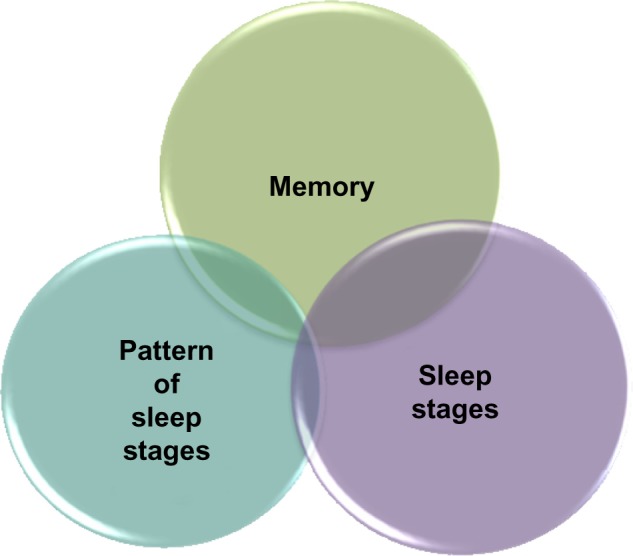
The interaction of sleep and memory.
Notes: The dual process theory suggests that certain types of memory are dependent on specific sleep states, such as REM sleep, or slow-wave sleep (a stage of NREM sleep). The sequential processing theory suggests that memories require an orderly succession of sleep stages, eg, slow-wave sleep followed by REM sleep. 20
Abbreviations: NREM, non-rapid eye movement; REM, rapid eye movement.
Both theories may help to explain how a student’s sleep pattern could impact learning. 21 In one study, REM sleep deprivation eliminated sleep-induced improvement on a visual perceptual learning (procedural) task; the same effect was not found with selective slow-wave sleep deprivation. 22 REM sleep normally occurs every 90–120 minutes, approximately 4–5 times in a typical night, with each REM sleep period growing progressively longer, with the last episode near rise time. 23 Therefore, college students with early morning classes may not attain the last 1–2 REM sleep periods, thus adversely affecting procedural memory. However, other studies suggest that NREM rather than REM sleep enhances procedural memories, while other studies correlated improvement with slow-wave sleep followed by REM sleep. 24 – 26 Both of these theories support that sleep deprivation may limit the amount of REM sleep and/or slow-wave sleep that students obtain, which may compromise both learning and memory, but further research is required to clarify this.
Many studies investigating the interaction of sleep, memory, and learning use scenarios of a specific memory task and then alter subjects’ sleep pattern or duration to determine the impact that sleep had on the subject’s performance. These scenarios often may not directly correlate with the memory and learning that college students are expected to perform or the alterations in their sleep schedule they experience. Despite these limitations, these studies illuminate the impact of sleep on students’ memory, learning, and potential academic performance.
Some students may “pull an all-nighter” (24 hours or more of sleep deprivation) before examinations in the hope of improved grades. The literature suggests that all-night study sessions are the wrong plan for improved grades and learning. Subjects were taught a visual discrimination task to identify the presence of “T” or “L” and the orientation of three diagonal bars on a screen. Subjects who were sleep deprived for 30 hours showed no improvement in performance, even after 2 days of post-recovery sleep. 26 Non-sleep-deprived subjects’ performance improved for the next 4 days. In another study investigating if improvement correlated with time or time spent in sleep, subjects were taught a motor task and then tested either after a 12-hour period of wakefulness or a 12-hour period that included sleep. 24 Subjects tested at 10 am and then retested at 10 pm without sleep showed no significant change in performance. After a night of sleep, subjects’ performance improved by 18%. Subjects tested at 10 pm initially, then retested after sleep, also had a significant improvement in performance. This supports the concept that sleep, and not just time, is required for learning and memory consolidation. It may be possible that there is a window for potential learning that requires sleep, and that this opportunity for learning may not be salvaged even after sleep is recovered.
Sleep before learning may also be necessary. To investigate this concept, subjects were tested on an episodic memory encoding task, which involved viewing a series of images with a recognition test 48 hours later. 27 Subjects were tested after 35 hours of sleep deprivation; memory performance was approximately two letter grades (19%; P =0.031) worse when compared to the non-sleep-deprived subjects. This difference did not seem to be due to alertness, as there was no significant difference between the two groups in terms of response rate, which has been correlated with alertness.
Looking at more global functions, total sleep deprivation showed a significant decrease of performance in cognitive tasks assessing inference, recognition of assumptions, and deduction. 28 Although this study was not carried out on college-aged students, subjects aged 10–14 years of age restricted to 5 hours of sleep, had impaired performance on verbal creativity and abstract thinking. 29 Less complex cognitive functions did not appear impaired; this has been shown in other studies and may indicate that motivation, individual response to sleep deprivation, or certain tasks may be less impacted by sleep. 20 , 30
Learning may also affect the intrinsic aspects of sleep. Procedural tasks prior to sleep increased slow-wave activity in the right parietal lobe, an area that is responsible for visual-spatial skills. 31 This increased right parietal activity correlated with improvement in the task. Other studies have found an increase in spindles, a defining feature of stage 2 sleep, after procedural memory training. 32 In an intensive 6-week French language immersion course, improvement was correlated with an increase in subjects’ percentage of REM sleep. 33
In summary, these finding suggest that sleep, likely before and after specific memory tasks, plays an integral part in memory consolidation. Many of these studies isolate memory into specific areas such as visual, declarative, or procedural; however, college students’ learning, memory, and performance in classes rarely would have such a narrow memory domain. Further research with real-life circumstances of students would better help clarify these important issues.
Causes of sleep deprivation and sleepiness
Among college-aged students, one of the most common causes of daytime sleepiness is sleep deprivation, ie, students get inadequate sleep because they go to bed late and wake up early. This occurs for multiple reasons; some are physiologic and others behavioral. The behavioral components may be particularly problematic on college campuses. However, sleep deprivation is not the only cause of sleepiness as college students are not immune to sleep disorders, which may also cause sleepiness. This section will review common causes of sleep deprivation as well as the prevalence of sleep disorders among college students, and the influence of sleep disorders on sleepiness.
Inadequate sleep hygiene
Sleep deprivation can arise from poor sleep behaviors; sleep hygiene encourages habits conducive to restorative sleep and avoidance of substances or behaviors that are not. Good sleep hygiene includes a regular sleep–wake schedule, quiet sleep environment, and avoidance of caffeine after lunch and stimulating activities before bed. 34 , 35 Substances are not the only aspect of inadequate sleep hygiene, as the ubiquitous use of technology before bed may also adversely affect sleep. Many students have inadequate sleep hygiene that, in conjunction with their delayed circadian rhythm, encourages sleep deprivation.
Approximately four out of five college students drink alcohol, with nearly 40% of men and women reporting “binge drinking” at least 4–5 drinks in a row within the last 14 days. 36 , 37 Alcohol shortens sleep latency, but then promotes fragmented sleep in the latter half of the night. 23 One study found that 11.6% of students who drank used alcohol as a sleep aid. 7 , 38 Alcohol may also increase the risk for obstructive sleep apnea. 39
Caffeine and energy drinks
Caffeine, equivalent to 2–4 cups of coffee taken at night, can increase sleep latency on average from 6.3 to 12.1 minutes, reduce sleepiness, and improve the ability to sustain wakefulness. 40 In this study, the effects of caffeine lasted 5.5–7.5 hours, suggesting that caffeine consumed even in the afternoon could impair the ability to fall asleep. Caffeine is an adenosine receptor antagonist and can increase arousal. Caffeine also may act on gamma-aminobutyric acid neurons of the posterior hypothalamus to suppress sleep-promoting pathways. 23 The net effect is that caffeine increases vigilance, alertness, and decreases sleepiness.
Energy drinks are becoming increasingly popular and 34% of 18–24-year-olds consume them regularly. In 2006, Americans spent more than $3.2 billion on energy drinks. 41 The majority (67%) of users consumed energy drinks to help compensate for insufficient sleep. 42 The contents of energy drinks are variable and depend on the individual product, but usually contain caffeine, herbal products, and sometimes vitamins and other supplements. Caffeine is the primary constituent responsible for the effect of increased energy. The amount of caffeine varies widely from 45–500 mg. Use of energy drinks is associated with higher use of alcohol and possibly other drugs, including stimulants. 43
Use of either prescribed or nonprescribed stimulants is a growing problem in young adults. The most commonly reported reason is to “stay awake to study” or increase concentration. 44 Students may utilize these drugs more than age-matched non-students. 45 A survey at 119 colleges and universities across the US found a 6.9% lifetime prevalence for the use of stimulants. 46 Other studies show prevalence as high as 14%. 44 , 47 Men are more likely than women to use stimulants, as well as caffeine and energy drinks. Nonprescribed use of stimulants is associated with increased use of alcohol, cocaine, and marijuana. 46 Not all stimulant use is illicit, as between 2%–8% of college students’ self-reported symptoms are consistent with attention deficit hyperactivity disorder (ADHD). 48 However, when parents of college students were asked to report such symptoms in their children, the prevalence of ADHD decreased to around 1%. Stimulants increase sleep latency and suppress REM sleep; subjects who use stimulant medications report worse sleep quality. 23 , 47
Inadequate sleep hygiene also encompasses the use of technology prior to bed. Relevant data often must be extrapolated from literature on adolescents, as few studies have focused on college students. The 2011 Sleep in America Poll addressed technology available in the bedroom. “Generation Y’ers” (adults aged 19–29 years old) are heavy users of technology prior to bed: 67% use cell phones, 43% music devices, 60% computers, and 18% video games. The majority (51%) report rarely getting a good night’s sleep and often wake unrefreshed. Computer use in the hour before bed is associated with less restful sleep, higher Epworth Sleepiness Scales, and drowsy driving. 49 Frequent use of cell phones around bedtime is associated with difficulties falling asleep, repeated awakenings, or waking up too early. 50 Most young adults (57%) leave their phone on during sleep, with only 33% turning it to silent or vibrate modes ( Table 1 ). Playing video games before bed can increase sleep latency, an average of 21.6 minutes. 51 Functional magnetic resonance imaging (fMRI) shows that video game playing heightens cognitive alertness, especially during violent scenes ( Table 1 ). 52
Frequent use of technology before bed is associated with sleep difficulties and daytime sleepiness
Note: Data from National Sleep Foundation; 49 Dworak et al. 51
Light exposure from various sources, including computers, tablet computers (eg, iPads; Apple Inc., Cupertino, CA, USA), and cell phones may also impact sleep. Melatonin, secreted by the pineal gland, helps regulate the circadian rhythm to the environment. 15 Normally, it is low or absent during the day and starts to rise about 2 hours before the habitual bedtime. Melatonin is suppressed by light, and light sources as low 200–300 lux (room lights) can cause suppression. 53 The amount of light from technologic devices is variable; for example, a tablet computer generated 50 lux suppressed melatonin in a cohort of college students after 2 hours of use. 54 A case report describes a student in Brazil who had a 40-minute delay in sleep on the weekends when electric lights were installed. 55 Bright light (8,000 lux) given at 7 pm or at 9 pm reduced nighttime sleepiness in students who had an evening preference and those with a later onset of melatonin. 56 One of the effects of technology may be to suppress melatonin, resulting in a delay in sleep onset.
In summary, many students engage in behaviors, such as those described above, which increase stimulation and alertness prior to bed. This, in conjunction with their delayed circadian rhythm, encourages late bedtimes and insufficient sleep. To combat sleepiness, students often drink caffeine and energy drinks, compromising sleep and ensuring a vicious cycle of sleep deprivation ( Table 2 ).
Challenges to good sleep hygiene in college students
Note: Data from. 41 , 43 , 47 , 49 , 54
Sleep disorders
Sleep deprivation is not the only cause of sleepiness on campus, as sleep disorders may also play a role. A survey of 1,845 students in introductory psychology labs suggested that 27% were at risk for at least one sleep disorder or sleep-related problem, including obstructive sleep apnea (4%), insomnia (12%), restless legs disorder and periodic limb movement disorder (8%), circadian rhythm sleep disorders (7%), and hypersomnia (4%). 57
Obstructive sleep apnea can be associated with significant sleepiness. 58 The prevalence of snoring may be more common than expected, as 30% of non-overweight students in a California school reported snoring. Men more commonly reported snoring (42%) than women (25%). 59 Asian students (37%) more often reported snoring than African-American (24%) or Caucasian (27%) students. Although such observations of snoring frequency do not reveal the prevalence of obstructive sleep apnea among college students, they do suggest that this disorder may not be as infrequent among young, otherwise healthy college students as is sometimes assumed.
Consequences of sleep deprivation and sleepiness
College is a time of intellectual growth and development as young adults’ transition from adolescence to adulthood. Although the worth of college in terms of increased productivity and higher earning potential is rarely debated, there is a significant personal and societal cost of college both in terms of time and money. For optimal return on the investment of time, effort, and money, students need to maximize their learning, academic, and personal growth. Sleepiness from any cause can compromise these goals, through impact on learning, memory, grades, perception of effort, driving performance, and mood. Although sleep deprivation has effects on many aspects of health, this article will focus on areas that may be particularly problematic for college students.
Grade point average (GPA) and academic performance
Despite growing evidence of the relationships between sleep, learning, and memory, a direct connection between learning and GPA has not yet been established. 60 A student’s GPA is not just an indication of learning, but instead involves a complex interaction between the student and their environment. 61 Intelligence, motivation, work ethic, personality, socioeconomic status, health problems, current and past school systems, course load, academic program, and test-taking abilities all may influence GPA.
Existing evidence does suggest an association between sleep and GPA. Students who obtained more sleep (long sleepers, ≥9 hours) had higher GPAs than short sleepers (≤6 hours): GPAs were 3.24 vs 2.74 on average, respectively. 62 More evidence exists to support an influence of sleep patterns rather than sleep duration on GPA. Students at a community college near Washington DC showed no difference in total sleep time (TST), sleepiness, or morning preference between high (GPA >3.5) and low (GPA <2.7) academic performers. 63 High academic performers instead showed earlier bed and rise times, though with similar overall TST. No difference was present between the two groups with regards to a morning preference, but a validated questionnaire was not used.
Among first-year university students, sleep patterns also influenced GPA; each hour delay in weekday or weekend rise time decreased the GPA by 0.132/4.0 and 0.115/4.0, respectively. 60 Bedtimes were also influential, with later bedtimes associated with lower GPAs. TST or circadian factors were not evaluated. These results do not explain why an earlier rise time was associated with better grades; it could arise from the sleep schedule itself, but many potential confounders exist. For example, early risers may also be more motivated or organized. Another possibility is that negative influences arise when students who have a nocturnal preference are unable to wake up earlier. In a study of medical students, subjects with an evening preference on the Horne–Ostberg Questionnaire had a more irregular sleep pattern than students with a morning or indifferent-type preference. Sleep duration was not different between the groups, but subjects with a more irregular sleep pattern had lower academic performance. 64 This suggests that sleep patterns influence academic performance more than sleep duration, with the caveat that students who have an evening preference may have a more irregular sleep schedule.
Extreme forms of irregular sleep schedules include all-night study sessions. No literature appears to address the association between all-nighter study sessions and GPA, but the absence of sleep is known to affect learning and performance improvement. Subjects taught a visual discrimination task who were then sleep deprived for 30 hours showed no improvement in the task, even after 2 days of post-recovery sleep. 26 Non-sleep-deprived subjects’ performance improved for the next 4 days. Similar results were demonstrated with a finger-tapping motor task; without sleep, no significant improvement occurred. 24 All-nighter study sessions may also alter motivation and perceived effort. Students’ self-perceived effort and performance were evaluated following two sleep scenarios: 24 hours of sleep deprivation or 8 hours of sleep. 28 Despite performing worse, sleep-deprived subjects felt they had better concentration, effort, and performance than did non-sleep-deprived subjects. Why sleep-deprived subjects rated their effort as higher is not known, and could be due to sleep deprivation itself, or relate to other unknown factors. This perception of improved performance following sleep deprivation may in part explain why it can be challenging to get students to change their sleep behavior. If students perceive no impairment in performance due to lack of sleep, they have little motivation to change.
Sleep disorders and academic performance
Students with sleep disorders probably do not achieve optimal academic performance, and up to 27% of students may be at risk for at least one sleep disorder. 57 Students at risk for academic failure (GPA <2.0) were at a disproportionately high risk for sleep disorders. Among those who screened positive for obstructive sleep apnea, 30% were at risk for academic failure. Medical students classified as frequent snorers more frequently failed their Internal Medicine examination (47%) than did occasional snorers (22.2%) or non-snorers (12.8%). After adjustment for age, BMI, and sex, the relative risk for snorers to fail the examination was 1.26 (95% confidence interval: 1.01–1.57). 65 Obstructive sleep apnea is suspected to have cognitive effects in both children and adults. 66 A higher percentage of students at risk for academic failure screened positive for other sleep disorders including: periodic limb movement disorder/restless legs syndrome (21%), 67 insomnia (22%), circadian rhythm sleep disorders (26%), and hypersomnia (21%). 57 As nearly one in four students is at risk for a sleep disorder, screening for sleep disorders among students with poor academic performance may well be advisable.
Although many students have a nocturnal preference, this preference can progress to delayed sleep-phase disorder (DSPD), a circadian rhythm disorder characterized by sleep-onset insomnia and difficulty waking at the desired time. 3 Consequences of DSPD may include missed morning classes, increased sleepiness, and decreased concentration, especially in morning classes. Students with DSPD have lower grades. 68 The prevalence of DSPD in the US college population may be as high as 6.7%–17%. 68 , 69
One of the most concerning consequences of sleep deprivation and sleepiness is drowsy driving. In the 2011 Sleep in America Poll, 66% of young adults reported drowsy driving. 49 However, few studies have evaluated drowsy driving specifically in college students. Among 1,039 undergraduate students, 16% reported falling asleep while driving and 2% had had a motor vehicle accident due to sleepiness. Men were more likely to fall asleep while driving than women. 38 A school in Utah had 86 student deaths due to motor vehicle accidents over a 15-year period; dozing/sleepiness was thought to be causative in 44%–72% of the cases. In a retrospective review of students’ “closest calls” for a motor vehicle accident due to sleepiness, most near accidents occurred between 11 pm and 1 am and often (39%) during the first hour of driving. Nearly half (48%) of students had a less intense dozing episode earlier in the same drive, with 68% of students continuing their drive despite feeling sleepy. 70 The findings overall suggest that drowsy driving accidents or near accidents are too frequent and that students may minimize the warning signs of drowsiness.
Driving, sleep deprivation, and alcohol
The impact of sustained wakefulness on driving performance has been compared to the impairment of performance that is produced by specific blood alcohol levels. In adults, sustained wakefulness of 17 hours was equivalent to a blood alcohol concentration (BAC) of 0.05%, and 24 hours was equivalent to 0.1%, above the legal level for intoxication in the US and most countries worldwide. 71 , 72 Similar findings were found in males aged 19–35 years of age, in whom 18.5 and 21 hours of wakefulness produced changes in driving performance mimicking a 0.08% BAC. 73 Sleep deprivation in combination with alcohol has a synergistic detrimental effect on driving performance. To evaluate these effects, young male college students were sleep restricted to 4 hours in bed; they then consumed alcohol until they attained BACs of 0.025 g/dL or 0.035 g/dL, equivalent to about 1–2 drinks. 74 A simulated driving task at 2 pm monitored crashes, speed variability, and lane deviations. Crashes occurred in 23% and 33% of the subjects (BAC 0.025 g/dL and 0.035 g/dL, respectively), compared to only 4.7% in the controls and 19% in sleep-restricted subjects who had no alcohol.
Driving after drinking is commonplace during college, as up to 34% of students reported driving after drinking within the last 30 days. 75 The combination of sleep deprivation and drinking may be especially common at the end of the semester, when sleep-deprived students celebrate the end of exams with drinks before driving home for the holiday break. The dangerous combination of sleep loss and alcohol could impair driving performance even in students who are not legally intoxicated.
Mood effects
Depression and sleep are interrelated. A cardinal feature of depression is disturbed sleep. 76 , 77 Depression is common during the college years: 14.8% of students report a diagnosis of depression and an estimated 11% have suicidal ideation. 78 Insufficient sleep can increase depressive symptoms. In a study of female college students, sleep debt of 2 hours per night and/or a bedtime after 2 am was associated with greater depressive symptoms. 79 Irregular sleep schedules have been associated with greater depressive symptoms. Prolonged sleep latency was associated with loss of pleasure, punishment feelings, and self-dislike. 80 Differences between sex were apparent, as women went to bed earlier, slept longer, had more nocturnal awakenings, and reported more depressive symptoms. However, when the sleep variable was removed by deleting the question, “Have you experienced changes in sleep?”, no significant difference in sex persisted, suggesting the greater incidence of depression in college-aged women may be due in part to the greater number of reported sleep difficulties. 80 , 81
Improving sleep may improve depressive symptoms. Cognitive behavioral therapy for insomnia (CBT-I) administered via email to college students with poor sleep quality produced greater improvement in depressive symptoms than did an intervention focused on mood and stress reduction. 67 A study on college students without reported sleepiness or depression found that sleep extension significantly improved scores on the Profile of Mood States. 82 Increased total sleep in teenagers has also been shown to improve mood. When school start time was delayed by 30 minutes, fewer students rated themselves as “at least somewhat unhappy or depressed”. 83 As sleep may be a modifiable risk factor for depression, further research is needed on ways to improve sleep and sleep quality in depressed subjects.
Complex relationships exist between suicide, mood disorders, and sleep. Insomnia may be a risk factor for suicidal ideation, suicide attempts, and death by suicide. 84 Conflicting results have been reported on whether both insomnia and nightmares increase the risk of suicidal ideation. 85 , 86 A confounder is that post-traumatic stress disorder (PTSD) may account for these associations. A study among college students found that insomnia and nightmares were independently associated with suicidal ideation. However, after depression, anxiety, and PTSD were taken into account, nightmares, but not insomnia, retained an association with suicidal ideation. The presence of nightmares in a student with depression may be a warning sign of increased risk for suicidal ideation that warrants further evaluation. 87
Potential interventions
While sleep deprivation, irregular sleep schedules and sleepiness are highly prevalent among college students, little information is available on effective ways for schools to successfully disseminate information on the importance of sleep and to potentially improve the sleep of their students. In general, the few programs that have been tried are expensive, time consuming, and available for only a limited number of students. A recent review of sleep education programs for children and adolescents found only twelve studies, of which four were available only as abstracts. 81
Educational programs
Improved sleep hygiene, which is widely believed to be beneficial, has been the focus of most educational programs on sleep, although there is little published support. An American Academy of Sleep Medicine Practice Parameter concluded in 1999 that insufficient evidence exists to recommend sleep hygiene as a single therapy or in combination with other treatments. 88 A study evaluating sleep hygiene awareness and sleep hygiene practice found only a weak association between knowledge and practice. However, good sleep hygiene practice was strongly correlated with good sleep quality. 35 Adequate sleep knowledge does not necessarily translate into practice. Many sleep hygiene recommendations, such as a quiet environment and use of the bedroom only for sleep, may be challenging in college dormitories.
One educational campaign with a focus on sleep hygiene included a “Go to Bed” poster, a 2-page “Snooze letter”, and sleep educational information in the school newspaper. An earlier bedtime, shorter sleep latency, longer sleep duration, and improved sleep quality, as measured by the Pittsburg Sleep Quality Index, was noted in 9% of students. 89 Although this intervention did not affect a large percentage of the student population, it was relatively inexpensive and did produce a measurable benefit ( Table 3 ).
Components in sleep educational programs
Note: Data from. 67 , 89 – 91 , 93
Sleep courses
In another study, a two-credit, 18-week course included group discussion, lectures, and self-evaluation. Topics included circadian rhythms, sleep hygiene, muscle relaxation, and public sleep education. 90 Participants had improved sleep quality over the semester and women reported decreased nap time. However, despite this intensive intervention, only a limited effect on sleep patterns was observed.
The Sleep Treatment and Education Program (STEPS) consisted of a 30-minute oral presentation and handouts on various aspects of sleep, provided to students attending introductory psychology classes. 91 Six weeks later, participants showed improved sleep quality and sleep hygiene. These results may be more robust than suggested, as sleep quality and sleep behaviors typically worsen as the semester progresses; therefore, this intervention not only halted this deterioration, but resulted in improvement. 92 Four supplementary sleep-learning modules, offered as extra credit, improved sleep knowledge and encouraged some sleep-related behavior changes, as 55% reported a change in their sleep hygiene as compared to 45% of control students ( P <0.01). 93 Students in the intervention reported specific behavior changes such as having a more “consistent wake time” versus a more general “trying to get more sleep” as indicated by the control students. However, all of these interventions are time consuming, involve only a select number of students, and may not be practicable on a large university scale.
Electronic cognitive behavioral therapy
More feasible options are under development. A modified form of cognitive behavioral therapy for insomnia (CBT-I) was emailed to students over an 8-week period. 67 Each weekly email contained an attachment to address several aspects of sleep, such as stabilizing the circadian rhythm by anchoring wake time, relaxation techniques, and a protocol for self-administered sleep restriction. This was compared to an alternative program (Breathe), which was created to reduce depressive symptoms and improve coping skills for stress. Participants in the sleep program (Refresh) had improvement in sleep quality and a decrease in depressive symptoms. Although the study involved only a small number (19 and 15, respectively), results showed promise as an effective electronic program that could be widely accessible and economically feasible for colleges and universities.
Class scheduling
The amount of sleep that students obtain is often dictated by the first obligation of the day, typically their first class. This is one reason why students often sleep longer and later on a vacation or summer schedule. 15 Therefore, class start times are an opportunity for intervention, but available information must be extrapolated from adolescent literature. A study at an independent college preparatory school showed increased sleep duration after a delay in school start time. The majority of students were boarders (81.5%) with structured lights-out schedules ranging from 10.30–11.30 pm. 83 When school was started at 8.30 am, 30 minutes later than usual, sleep duration was increased by 45 minutes on school days. An unexpected effect was that bedtime shifted earlier by 15 minutes. Following the time change, fewer students reported daytime sleepiness (49.1% to 20.0%), sleepiness in class (85.1% to 60.5%), and falling asleep in class (38% to 18%). A positive effect on mood was found, with a decrease in the Depressed Mood Scale. 83 Students continued to have significant “oversleeping” on the weekend, by nearly 3 hours. A study of eighth graders (mean age 13.7 years) who had 1 hour of sleep extension for 5 days through delays in the school start time, documented improved attention and performance. 94 This growing evidence from adolescents suggests that later school start times do increase total sleep duration, attention, and performance, but the data needs to be replicated in college students ( Table 4 ).
Potential interventions to reduce sleep deprivation and sleepiness
Although not often considered as an intervention for sleep deprivation, daytime naps may offer a potential remedy that may also help academic performance. Interestingly, in light of how napping may improve certain memory tasks, high academic performers were more likely to nap than low academic performers (52% vs 29%, respectively). 63 In a study of non-sleep-deprived subjects, deterioration in the performance of a visual perception task occurred during the day. 95 Intervening naps of 60 or 90 minutes halted this deterioration, but only naps with both REM and slow-wave sleep resulted in improvement compared to baseline. Sustained wakefulness can impair performance. In an episodic memory-encoding task (face and name recognition), significant deterioration at 6 pm occurred in all subjects, except those who had had a 100-minute nap. In the nap group, not only was performance deterioration abated, but improvement was noted. 27 Following training to recognize phonetically similar words, subjects showed an increase in accuracy, but 12 hours of sustained wakefulness reduced improvements by half. A nap prevented this decrement in performance. 96 , 97 In short, naps may enhance certain cognitive and performance tasks, but further research is still needed in this important area.
The college years are a time of critical transition from adolescence to adulthood. For many individuals, this transition is associated with inadequate sleep and daytime sleepiness. Many factors contribute to this, including the students’ own circadian physiology. Class times are often scheduled without consideration of young adults’ circadian patterns. Inadequate sleep hygiene is common, as students often use technology and substances that compromise sleep quality and quantity. This chronic sleep deprivation may impair academic performance, mood regulation, and driving safety. Students who attain sufficient sleep may still struggle with sleepiness due to sleep disorders.
Further research is needed to not only determine how to best educate students about the importance of sleep and the consequences of sleep deprivation, but also how to translate this knowledge into practice. Electronic or web-based interventions may be economically feasible and attractive to an electronically savvy demographic. Universities and colleges need to understand, acknowledge, and publicize that policies and class schedules may have substantial impacts on the sleep, learning, and health of their students. Investigation of new approaches to promote good sleep and sleep habits could have significant public health impact and should be prioritized.
The authors report no conflicts of interest in this work.
- 1. Oginska H, Pokorski J. Fatigue and mood correlates of sleep length in three age-social goups: school children, students, and employees. Chronobiol Int. 2006;23(6):1317–1328. doi: 10.1080/07420520601089349. [ DOI ] [ PubMed ] [ Google Scholar ]
- 2. American College Health Association . American College Health Association: National College Health Assessment II Reference Group Executive Summary Spring 2012. Hanover, MD: American College Health Association; 2012. [Accessed February 20, 2014]. Available from: http://www.acha-ncha.org/docs/ACHA-NCHA-II_ReferenceGroup_ExecutiveSummary_Spring2012.pdf . [ Google Scholar ]
- 3. American Academcy of Sleep Medicine Diagnostic and Coding Manual. International Classification of Sleep Disorders. 2nd ed. Westchester, IL: American Academy of Sleep Medicine; 2005. [ Google Scholar ]
- 4. Kryger MH, Roth T, Dement WC, editors. Principles and Practice of Sleep Medicine. St Louis, MO: Elsevier BV; 2005. [ Google Scholar ]
- 5. Wehr TA, Moul DE, Barbato G, et al. Conservation of photoperiod-responsive mechanisms in humans. Am J Physiol. 1993;265(4 Pt 2):R846–R857. doi: 10.1152/ajpregu.1993.265.4.R846. [ DOI ] [ PubMed ] [ Google Scholar ]
- 6. Van Dongen HP, Maislin G, Mullington JM, Dinges DF. The cumulative cost of additional wakefulness: dose-response effects on neurobehavioral functions and sleep physiology from chronic sleep restriction and total sleep deprivation. Sleep. 2003;26(2):117–126. doi: 10.1093/sleep/26.2.117. [ DOI ] [ PubMed ] [ Google Scholar ]
- 7. Lund HG, Reider BD, Whiting AB, Prichard JR. Sleep patterns and predictors of disturbed sleep in a large population of college students. J Adolesc Health. 2010;46(2):124–132. doi: 10.1016/j.jadohealth.2009.06.016. [ DOI ] [ PubMed ] [ Google Scholar ]
- 8. Bachman L, Bachman C. Student perceptions of academic workload in architectural education. J Archit Plan Res. 2006;23(4):271–304. [ Google Scholar ]
- 9. Hershner S. College students’ sleep habits and GPA. Sleep. 2011;34(Abstract Supplement):A102. [ Google Scholar ]
- 10. American College Health Association . American College Health Association: National College Health Assessment II Reference Group Executive Summary Fall 2011. Hanover, MD: American College Health Association; 2011. [Accessed February 20, 2014]. Available from: http://www.acha-ncha.org/docs/ACHA-NCHA-II_ReferenceGroup_ExecutiveSummary_Fall2011.pdf . [ Google Scholar ]
- 11. Borbély AA. A two process model of sleep regulation. Hum Neurobiol. 1982;1(3):195–204. [ PubMed ] [ Google Scholar ]
- 12. Jenni OG, Carskadon MA. Sleep behavior and sleep regulation from infancy through adolescence: normative aspects. Sleep Med Clin. 2007;2(3):321–329. [ Google Scholar ]
- 13. Khaylis A, Trockel M, Taylor CB. Binge drinking in women at risk for developing eating disorders. Int J Eat Disorder. 2009;42(5):409–414. doi: 10.1002/eat.20644. [ DOI ] [ PubMed ] [ Google Scholar ]
- 14. Carskadon MA, Vieira C, Acebo C. Association between puberty and delayed phase preference. Sleep. 1993;16(3):258–262. doi: 10.1093/sleep/16.3.258. [ DOI ] [ PubMed ] [ Google Scholar ]
- 15. Crowley SJ, Acebo C, Carskadon MA. Sleep, circadian rhythms, and delayed phase in adolescence. Sleep Med. 2007;8(6):602–612. doi: 10.1016/j.sleep.2006.12.002. [ DOI ] [ PubMed ] [ Google Scholar ]
- 16. Carskadon MA, Acebo C, Arnedt JT. Failure to identify pubertally-mediated melatonin sensitivity to light in adolescents. Sleep. 2002;25:A191. [ Google Scholar ]
- 17. Hansen M, Janssen I, Schiff A, Zee PC, Dubocovich ML. The impact of school daily schedule on adolescent sleep. Pediatrics. 2005;115(6):1555–1561. doi: 10.1542/peds.2004-1649. [ DOI ] [ PubMed ] [ Google Scholar ]
- 18. Roenneberg T, Wirz-Justice A, Merrow M. Life between clocks: daily temporal patterns of human chronotypes. J Biol Rhythm. 2003;18(1):80–90. doi: 10.1177/0748730402239679. [ DOI ] [ PubMed ] [ Google Scholar ]
- 19. Thorleifsdottir B, Björnsson JK, Benediktsdottir B, Gislason T, Kristbjarnarson H. Sleep and sleep habits from childhood to young adulthood over a 10-year period. J Psychosom Res. 2002;53(1):529–537. doi: 10.1016/s0022-3999(02)00444-0. [ DOI ] [ PubMed ] [ Google Scholar ]
- 20. Curcio G, Ferrara M, De Gennaro L. Sleep loss, learning capacity and academic performance. Sleep Med Rev. 2006;10(5):323–337. doi: 10.1016/j.smrv.2005.11.001. [ DOI ] [ PubMed ] [ Google Scholar ]
- 21. Rauchs G, Desgranges B, Foret J, Eustache F. The relationships between memory systems and sleep stages. J Sleep Res. 2005;14(2):123–140. doi: 10.1111/j.1365-2869.2005.00450.x. [ DOI ] [ PubMed ] [ Google Scholar ]
- 22. Karni A, Tanne D, Rubenstein BS, Askenasy JJ, Sagi D. Dependence on REM sleep of overnight improvement of a perceptual skill. Science. 1994;265(5172):679–682. doi: 10.1126/science.8036518. [ DOI ] [ PubMed ] [ Google Scholar ]
- 23. Amlander CJ, Fuller PM, editors. Basics of Sleep Guide. 2nd ed. Westchester, IL: Sleep Research Society; 2005. [ Google Scholar ]
- 24. Walker MP, Brakefield T, Morgan A, Hobson JA, Stickgold R. Practice with sleep makes perfect: sleep-dependent motor skill learning. Neuron. 2002;35(1):205–211. doi: 10.1016/s0896-6273(02)00746-8. [ DOI ] [ PubMed ] [ Google Scholar ]
- 25. Smith C, MacNeill C. Impaired motor memory for a pursuit rotor task following Stage 2 sleep loss in college students. J Sleep Res. 1994;3(4):206–213. doi: 10.1111/j.1365-2869.1994.tb00133.x. [ DOI ] [ PubMed ] [ Google Scholar ]
- 26. Stickgold R, James L, Hobson JA. Visual discrimination learning requires sleep after training. Nat Neurosci. 2000;3(12):1237–1238. doi: 10.1038/81756. [ DOI ] [ PubMed ] [ Google Scholar ]
- 27. Mander BA, Santhanam S, Saletin JM, Walker MP. Wake deterioration and sleep restoration of human learning. Curr Biol. 2011;21(5):R183–R184. doi: 10.1016/j.cub.2011.01.019. [ DOI ] [ PMC free article ] [ PubMed ] [ Google Scholar ]
- 28. Pilcher JJ, Walters AS. How sleep deprivation affects psychological variables related to college students’ cognitive performance. J Am Coll Health. 1997;46(3):121–126. doi: 10.1080/07448489709595597. [ DOI ] [ PubMed ] [ Google Scholar ]
- 29. Randazzo AC, Muehlbach MJ, Schweitzer PK, Walsh JK. Cognitive function following acute sleep restriction in children ages 10–14. Sleep. 1998;21(8):861–868. [ PubMed ] [ Google Scholar ]
- 30. Carskadon MA, Harvey K, Dement WC. Sleep loss in young adolescents. Sleep. 1981;4(3):299–312. doi: 10.1093/sleep/4.3.299. [ DOI ] [ PubMed ] [ Google Scholar ]
- 31. Huber R, Ghilardi MF, Massimini M, Tononi G. Local sleep and learning. Nature. 2004;430(6995):78–81. doi: 10.1038/nature02663. [ DOI ] [ PubMed ] [ Google Scholar ]
- 32. Briere ME, Forest G, Lussier I, Godbout R. Implicit verbal recall correlates positively with EEG sleep spindle activity. Sleep. 2000;23(Suppl 2):A219. [ Google Scholar ]
- 33. De Koninck J, Lorrain D, Christ G, Proulx G, Coulombe D. Intensive language learning and increases in rapid eye movement sleep: evidence of a performance factor. Int J Psychophysiol. 1989;8(1):43–47. doi: 10.1016/0167-8760(89)90018-4. [ DOI ] [ PubMed ] [ Google Scholar ]
- 34. Stepanski EJ, Wyatt JK. Use of sleep hygiene in the treatment of insomnia. Sleep Med Rev. 2003;7(3):215–225. doi: 10.1053/smrv.2001.0246. [ DOI ] [ PubMed ] [ Google Scholar ]
- 35. Brown FC, Buboltz WC, Jr, Soper B. Relationship of sleep hygiene awareness, sleep hygiene practices, and sleep quality in university students. Behav Med. 2002;28(1):33–38. doi: 10.1080/08964280209596396. [ DOI ] [ PubMed ] [ Google Scholar ]
- 36. Task Force of the National Advisory Council on Alcohol Abuse and Alcoholism . A call to action: Changing the culture of drinking at US colleges. Bethesda, MD: National Institute on Alcohol Abuse and Alcoholism; 2002. [Accessed August 8, 2013]. (NIH Publication No 02-5010). Available at: http://www.collegedrinkingprevention.gov/media/taskforcereport.pdf . [ Google Scholar ]
- 37. O’Malley PM, Johnston LD. Epidemiology of alcohol and other drug use among American college students. J Stud Alcohol Suppl. 2002;(14):23–39. doi: 10.15288/jsas.2002.s14.23. [ DOI ] [ PubMed ] [ Google Scholar ]
- 38. Taylor DJ, Bramoweth AD. Patterns and consequences of inadequate sleep in college students: substance use and motor vehicle accidents. J Adolesc Health. 2010;46(6):610–612. doi: 10.1016/j.jadohealth.2009.12.010. [ DOI ] [ PubMed ] [ Google Scholar ]
- 39. Young T, Skatrud J, Peppard PE. Risk factors for obstructive sleep apnea in adults. J Am Med Assoc. 2004;291(16):2013–2016. doi: 10.1001/jama.291.16.2013. [ DOI ] [ PubMed ] [ Google Scholar ]
- 40. Walsh JK, Muehlbach MJ, Humm TM, Dickins QS, Sugerman JL, Schweitzer PK. Effect of caffeine on physiological sleep tendency and ability to sustain wakefulness at night. Psychopharmacology. 1990;101(2):271–273. doi: 10.1007/BF02244139. [ DOI ] [ PubMed ] [ Google Scholar ]
- 41. O’Brien MC, McCoy TP, Rhodes SD, Wagoner A, Wolfson M. Caffeinated cocktails: energy drink consumption, high-risk drinking, and alcohol-related consequences among college students. Acad Emerg Med. 2008;15(5):453–460. doi: 10.1111/j.1553-2712.2008.00085.x. [ DOI ] [ PubMed ] [ Google Scholar ]
- 42. Malinauskas BM, Aeby VG, Overton RF, Carpenter-Aeby T, Barber-Heidal K. A survey of energy drink consumption patterns among college students. Nutr J. 2007;6:35. doi: 10.1186/1475-2891-6-35. [ DOI ] [ PMC free article ] [ PubMed ] [ Google Scholar ]
- 43. Arria AM, Caldeira KM, Kasperski SJ, et al. Increased alcohol consumption, nonmedical prescription drug use, and illicit drug use are associated with energy drink consumption among college students. J Addict Med. 2010;4(2):74–80. doi: 10.1097/ADM.0b013e3181aa8dd4. [ DOI ] [ PMC free article ] [ PubMed ] [ Google Scholar ]
- 44. Arria AM. Compromised sleep quality and low GPA among college students who use prescription stimulants nonmedically. Sleep Med. 2011;12(6):536–537. doi: 10.1016/j.sleep.2011.04.001. [ DOI ] [ PubMed ] [ Google Scholar ]
- 45. Johnston LD, O’Malley PM, Bachman JG. Volume II: College Students and Adults Ages 19–40. Washington, DC: US Department of Health and Human Services; 2002. Monitoring the Future: National Survey Results on Drug Use, 1975–2002. [ Google Scholar ]
- 46. McCabe SE, Knight JR, Teter CJ, Wechser H. Non-medical use of prescription stimulants among US college students: prevalence and correlates from a national survey. Addiction. 2005;100(1):96–106. doi: 10.1111/j.1360-0443.2005.00944.x. [ DOI ] [ PubMed ] [ Google Scholar ]
- 47. Clegg-Kraynok MM, McBean AL, Montgomery-Downs HE. Sleep quality and characteristics of college students who use prescription psychostimulants nonmedically. Sleep Med. 2011;12(6):598–602. doi: 10.1016/j.sleep.2011.01.012. [ DOI ] [ PubMed ] [ Google Scholar ]
- 48. DuPaul GJ, Weyandt LL, O’Dell SM, Varejao M. College students with ADHD current status and future directions. J Atten Disord. 2009;13(3):234–250. doi: 10.1177/1087054709340650. [ DOI ] [ PubMed ] [ Google Scholar ]
- 49. National Sleep Foundation . Sleep in America: Technology Use and Sleep. Arlington, VA: National Sleep Foundation; 2011. [Accessed June 6, 2014]. Available at: http://sleepfoundation.org/sites/default/files/sleepinamericapoll/SIAP_2011_Summary_of_Findings.pdf . [ Google Scholar ]
- 50. Thomée S, Eklöf M, Gustafsson E, Nilsson R, Hagberg M. Prevalence of perceived stress, symptoms of depression and sleep disturbances in relation to information and communication technology (ICT) use among young adults – an explorative prospective study. Comput Human Behav. 2007;23(3):1300–1321. [ Google Scholar ]
- 51. Dworak M, Schierl T, Bruns T, Strüder HK. Impact of singular excessive computer game and television exposure on sleep patterns and memory performance of school-aged children. Pediatrics. 2007;120(5):978–985. doi: 10.1542/peds.2007-0476. [ DOI ] [ PubMed ] [ Google Scholar ]
- 52. Mathiak K, Weber R. Toward brain correlates of natural behavior: fMRI during violent video games. Hum Brain Mapp. 2006;27(12):948–956. doi: 10.1002/hbm.20234. [ DOI ] [ PMC free article ] [ PubMed ] [ Google Scholar ]
- 53. Zeitzer JM, Dijk DJ, Kronauer RE, Brown EN, Czeisler CA. Sensitivity of the human circadian pacemaker to nocturnal light: melatonin phase resetting and suppression. J Physiol. 2000;526(Pt 3):695–702. doi: 10.1111/j.1469-7793.2000.00695.x. [ DOI ] [ PMC free article ] [ PubMed ] [ Google Scholar ]
- 54. Wood B, Rea MS, Plitnick B, Figueiro MG. Light level and duration of exposure determine the impact of self-luminous tablets on melatonin suppression. Appl Ergon. 2013;44(2):237–240. doi: 10.1016/j.apergo.2012.07.008. [ DOI ] [ PubMed ] [ Google Scholar ]
- 55. Louzada F, Inacio AM, Souza FHM, Moreno CRC. Exposure to light versus way of life: effects on sleep patterns of a teenager – case report. Chronobiol Int. 2004;21(3):497–499. doi: 10.1081/cbi-120038743. [ DOI ] [ PubMed ] [ Google Scholar ]
- 56. Teixeira L, Lowden A, Luz AA, et al. Exposure to bright light during evening class hours increases alertness among working college students. Sleep Med. 2013;14(1):91–97. doi: 10.1016/j.sleep.2012.08.017. [ DOI ] [ PubMed ] [ Google Scholar ]
- 57. Gaultney JF. The prevalence of sleep disorders in college students: impact on academic performance. J Am Coll Health. 2010;59(2):91–97. doi: 10.1080/07448481.2010.483708. [ DOI ] [ PubMed ] [ Google Scholar ]
- 58. Chervin RD. Sleepiness, fatigue, tiredness, and lack of energy in obstructive sleep apnea. Chest. 2000;118(2):372–379. doi: 10.1378/chest.118.2.372. [ DOI ] [ PubMed ] [ Google Scholar ]
- 59. Patel M, Tran D, Chakrabarti A, Vasquez A, Gilbert P, Davidson T. Prevalence of snoring in college students. J Am Coll Health. 2008;57(1):45–52. doi: 10.3200/JACH.57.1.45-52. [ DOI ] [ PubMed ] [ Google Scholar ]
- 60. Trockel MT, Barnes MD, Egget DL. Health-related variables and academic performance among first-year college students: implications for sleep and other behaviors. J Am Coll Health. 2000;49(3):125–131. doi: 10.1080/07448480009596294. [ DOI ] [ PubMed ] [ Google Scholar ]
- 61. Betts JR, Morell D. The determinants of undergraduate grade point average: the relative importance of family background, high school resources, and peer group effects. J Hum Resour. 1999;34(2):268–293. [ Google Scholar ]
- 62. Kelly WE, Kelley KE, Clanton RC. The relationship between sleep length and grade-point average among college students. Coll Stud J. 2001;35(1):84–86. [ Google Scholar ]
- 63. Eliasson AH, Lettieri CJ, Eliasson AH. Early to bed, early to rise! Sleep habits and academic performance in college students. Sleep Breath. 2010;14(1):71–75. doi: 10.1007/s11325-009-0282-2. [ DOI ] [ PubMed ] [ Google Scholar ]
- 64. Medeiros AL. The relationship between sleep-wake cycle and academic performance in medical students. Biol Rhythm Res. 2001;32(2):263–270. [ Google Scholar ]
- 65. Ficker JH, Wiest GH, Lehnert G, Meyer M, Hahn EG. Are snoring medical students at risk of failing their exams? Sleep. 1999;22(2):205–209. doi: 10.1093/sleep/22.2.205. [ DOI ] [ PubMed ] [ Google Scholar ]
- 66. Alchanatis M, Zias N, Deligiorgis N, Amfilochiou A, Dionellis G, Orphanidou D. Sleep apnea-related cognitive deficits and intelligence: an implication of cognitive reserve theory. J Sleep Res. 2005;14(1):69–75. doi: 10.1111/j.1365-2869.2004.00436.x. [ DOI ] [ PubMed ] [ Google Scholar ]
- 67. Trockel M, Manber R, Chang V, Thurston A, Taylor CB. An e-mail delivered CBT for sleep-health program for college students: effects on sleep quality and depression symptoms. J Clin Sleep Med. 2011;7(3):273–278. doi: 10.5664/JCSM.1072. [ DOI ] [ PMC free article ] [ PubMed ] [ Google Scholar ]
- 68. Lack LC. Delayed sleep and sleep loss in university students. J Am Coll Health. 1986;35(3):105–110. doi: 10.1080/07448481.1986.9938970. [ DOI ] [ PubMed ] [ Google Scholar ]
- 69. Brown FC, Soper B, Buboltz WC., Jr Prevalence of delayed sleep phase syndrome in university students. Coll Stud J. 2001;35(3):472. [ Google Scholar ]
- 70. Lindsay GA, Hanks WA, Hurley RD, Dane S. Descriptive epidemiology of dozing and driving in a college student population. J Am Coll Health. 1999;47(4):157–162. doi: 10.1080/07448489909595641. [ DOI ] [ PubMed ] [ Google Scholar ]
- 71. Dawson D, Reid K. Fatigue, alcohol and performance impairment. Nature. 1997;388(6639):235. doi: 10.1038/40775. [ DOI ] [ PubMed ] [ Google Scholar ]
- 72. International Center For Alcohol Policies . Blood Alcohol Concentration (BAC) Limits Worldwide. Washington, DC: International Center For Alcohol Policies; 2013. [Accessed April 30, 2013]. Available at: http://www.icap.org/PolicyIssues/DrinkingandDriving . [ Google Scholar ]
- 73. Arnedt JT, Wilde GJ, Munt PW, MacLean AW. How do prolonged wakefulness and alcohol compare in the decrements they produce on a simulated driving task? Accid Anal Prev. 2001;33(3):337–344. doi: 10.1016/s0001-4575(00)00047-6. [ DOI ] [ PubMed ] [ Google Scholar ]
- 74. Vakulin A, Baulk SD, Catcheside PG, et al. Effects of moderate sleep deprivation and low-dose alcohol on driving simulator performance and perception in young men. Sleep. 2007;30(10):1327–1333. doi: 10.1093/sleep/30.10.1327. [ DOI ] [ PMC free article ] [ PubMed ] [ Google Scholar ]
- 75. American College Health Association American College Health Association National College Health Assessment Spring 2006 Reference Group data report (abridged) J Am Coll Health. 2007;55(4):195–206. doi: 10.3200/JACH.55.4.195-206. [ DOI ] [ PubMed ] [ Google Scholar ]
- 76. Buysse DJ, Angst J, Gamma A, Ajdacic V, Eich D, Rössler W. Prevalence, course, and comorbidity of insomnia and depression in young adults. Sleep. 2008;31(4):473–480. doi: 10.1093/sleep/31.4.473. [ DOI ] [ PMC free article ] [ PubMed ] [ Google Scholar ]
- 77. Ford DE, Kamerow DB. Epidemiologic study of sleep disturbances and psychiatric disorders. An opportunity for prevention? JAMA. 1989;262(11):1479–1484. doi: 10.1001/jama.262.11.1479. [ DOI ] [ PubMed ] [ Google Scholar ]
- 78. Garlow SJ, Rosenberg J, Moore JD, et al. Depression, desperation, and suicidal ideation in college students: results from the American Foundation for Suicide Prevention College Screening Project at Emory University. Depress Anxiety. 2008;25(6):482–488. doi: 10.1002/da.20321. [ DOI ] [ PubMed ] [ Google Scholar ]
- 79. Regestein Q, Natarajan V, Pavlova M, Kawasaki S, Gleason R, Koff E. Sleep debt and depression in female college students. Psychiatry Res. 2010;176(1):34–39. doi: 10.1016/j.psychres.2008.11.006. [ DOI ] [ PubMed ] [ Google Scholar ]
- 80. Brooks PR, Giigenti AA, Milles MJ. Sleep patterns and symptoms of depression in college students. Coll Stud J. 2009;43(2):464–472. [ Google Scholar ]
- 81. Blunden SL, Chapman J, Rigney GA. Are sleep education programs successful? The case for improved and consistent research efforts. Sleep Med Rev. 2012;16(4):355–370. doi: 10.1016/j.smrv.2011.08.002. [ DOI ] [ PubMed ] [ Google Scholar ]
- 82. Kamdar BB, Kaplan KA, Kezirian EJ, Dement WC. The impact of extended sleep on daytime alertness, vigilance, and mood. Sleep Med. 2004;5(5):441–448. doi: 10.1016/j.sleep.2004.05.003. [ DOI ] [ PubMed ] [ Google Scholar ]
- 83. Owens JA, Belon K, Moss P. Impact of delaying school start time on adolescent sleep, mood, and behavior. Arch Pediatr Adolesc Med. 2010;164(7):608–614. doi: 10.1001/archpediatrics.2010.96. [ DOI ] [ PubMed ] [ Google Scholar ]
- 84. Fujino Y, Mizoue T, Tokui N, Yoshimura T. Prospective cohort study of stress, life satisfaction, self-rated health, insomnia, and suicide death in Japan. Suicide Life Threat Behav. 2005;35(2):227–237. doi: 10.1521/suli.35.2.227.62876. [ DOI ] [ PubMed ] [ Google Scholar ]
- 85. Cukrowicz KC, Otamendi A, Pinto JV, Bernert RA, Krakow B, Joiner TE., Jr The impact of insomnia and sleep disturbances on depression and suicidality. Dreaming. 2006;16(1):1–10. [ Google Scholar ]
- 86. Sjostrom N, Waern M, Hetta J. Nightmares and sleep disturbances in relation to suicidality in suicide attempters. Sleep. 2007;30(1):91–95. doi: 10.1093/sleep/30.1.91. [ DOI ] [ PubMed ] [ Google Scholar ]
- 87. Nadorff MR, Nazem S, Fiske A. Insomnia symptoms, nightmares, and suicidal ideation in a college student sample. Sleep. 2011;34(1):93–98. doi: 10.1093/sleep/34.1.93. [ DOI ] [ PMC free article ] [ PubMed ] [ Google Scholar ]
- 88. Chesson AL, Anderson WM, Littner M, et al. Practice parameters for the nonpharmacologic treatment of chronic insomnia. Sleep. 1999;22(8):1128–1133. doi: 10.1093/sleep/22.8.1128. [ DOI ] [ PubMed ] [ Google Scholar ]
- 89. Orzech KM, Salafsky DB, Hamilton LA. The state of sleep among college students at a large public university. J Am Coll Health. 2011;59(7):612–619. doi: 10.1080/07448481.2010.520051. [ DOI ] [ PubMed ] [ Google Scholar ]
- 90. Tsai LL, Li SP. Sleep education in college: a preliminary study. Percept Mot Skills. 2004;99(3):837–848. doi: 10.2466/pms.99.3.837-848. [ DOI ] [ PubMed ] [ Google Scholar ]
- 91. Brown FC, Buboltz WC, Jr, Soper B. Development and evaluation of the Sleep Treatment and Education Program for Students (STEPS) J Am Coll Health. 2006;54(4):231–237. doi: 10.3200/JACH.54.4.231-237. [ DOI ] [ PubMed ] [ Google Scholar ]
- 92. Hawkins J, Shaw P. Self-reported sleep quality in college students: a repeated measures approach. Sleep. 1992;15(6):545–549. doi: 10.1093/sleep/15.6.545. [ DOI ] [ PubMed ] [ Google Scholar ]
- 93. Quan SF, Anderson JL, Hodge GK. Use of a supplementary internet based education program improves sleep literacy in college psychology students. J Clin Sleep Med. 2013;9(2):155–160. doi: 10.5664/jcsm.2414. [ DOI ] [ PMC free article ] [ PubMed ] [ Google Scholar ]
- 94. Lufi D, Tzischinsky O, Hadar S. Delaying school starting time by one hour: some effects on attention levels in adolescents. J Clin Sleep Med. 2011;7(2):137–143. [ PMC free article ] [ PubMed ] [ Google Scholar ]
- 95. Mednick S, Nakayama K, Stickgold R. Sleep-dependent learning: a nap is as good as a night. Nat Neurosci. 2003;6(7):697–698. doi: 10.1038/nn1078. [ DOI ] [ PubMed ] [ Google Scholar ]
- 96. Fenn KM, Nusbaum HC, Margoliash D. Consolidation during sleep of perceptual learning of spoken language. Nature. 2003;425(6958):614–616. doi: 10.1038/nature01951. [ DOI ] [ PubMed ] [ Google Scholar ]
- 97. Walker MP, Stickgold R. Sleep-dependent learning and memory consolidation. Neuron. 2004;44(1):121–133. doi: 10.1016/j.neuron.2004.08.031. [ DOI ] [ PubMed ] [ Google Scholar ]
- View on publisher site
- PDF (412.5 KB)
- Collections
Similar articles
Cited by other articles, links to ncbi databases.
- Download .nbib .nbib
- Format: AMA APA MLA NLM
Add to Collections

🚀 Work With Us
Private Coaching
Language Editing
Qualitative Coding
✨ Free Resources
Templates & Tools
Short Courses
Articles & Videos
1000+ FREE Research Topics & Title Ideas
Select your area of interest to view a collection of potential research topics and ideas.
Or grab the full list 📋 (for free)

PS – You can also check out our free topic ideation webinar for more ideas
How To Find A Research Topic
If you’re struggling to get started, this step-by-step video tutorial will help you find the perfect research topic.
Research Topic FAQs
What (exactly) is a research topic.
A research topic is the subject of a research project or study – for example, a dissertation or thesis. A research topic typically takes the form of a problem to be solved, or a question to be answered.
A good research topic should be specific enough to allow for focused research and analysis. For example, if you are interested in studying the effects of climate change on agriculture, your research topic could focus on how rising temperatures have impacted crop yields in certain regions over time.
To learn more about the basics of developing a research topic, consider our free research topic ideation webinar.
What constitutes a good research topic?
A strong research topic comprises three important qualities : originality, value and feasibility.
- Originality – a good topic explores an original area or takes a novel angle on an existing area of study.
- Value – a strong research topic provides value and makes a contribution, either academically or practically.
- Feasibility – a good research topic needs to be practical and manageable, given the resource constraints you face.
To learn more about what makes for a high-quality research topic, check out this post .
What's the difference between a research topic and research problem?
A research topic and a research problem are two distinct concepts that are often confused. A research topic is a broader label that indicates the focus of the study , while a research problem is an issue or gap in knowledge within the broader field that needs to be addressed.
To illustrate this distinction, consider a student who has chosen “teenage pregnancy in the United Kingdom” as their research topic. This research topic could encompass any number of issues related to teenage pregnancy such as causes, prevention strategies, health outcomes for mothers and babies, etc.
Within this broad category (the research topic) lies potential areas of inquiry that can be explored further – these become the research problems . For example:
- What factors contribute to higher rates of teenage pregnancy in certain communities?
- How do different types of parenting styles affect teen pregnancy rates?
- What interventions have been successful in reducing teenage pregnancies?
Simply put, a key difference between a research topic and a research problem is scope ; the research topic provides an umbrella under which multiple questions can be asked, while the research problem focuses on one specific question or set of questions within that larger context.
How can I find potential research topics for my project?
There are many steps involved in the process of finding and choosing a high-quality research topic for a dissertation or thesis. We cover these steps in detail in this video (also accessible below).
How can I find quality sources for my research topic?
Finding quality sources is an essential step in the topic ideation process. To do this, you should start by researching scholarly journals, books, and other academic publications related to your topic. These sources can provide reliable information on a wide range of topics. Additionally, they may contain data or statistics that can help support your argument or conclusions.
Identifying Relevant Sources
When searching for relevant sources, it’s important to look beyond just published material; try using online databases such as Google Scholar or JSTOR to find articles from reputable journals that have been peer-reviewed by experts in the field.
You can also use search engines like Google or Bing to locate websites with useful information about your topic. However, be sure to evaluate any website before citing it as a source—look for evidence of authorship (such as an “About Us” page) and make sure the content is up-to-date and accurate before relying on it.
Evaluating Sources
Once you’ve identified potential sources for your research project, take some time to evaluate them thoroughly before deciding which ones will best serve your purpose. Consider factors such as author credibility (are they an expert in their field?), publication date (is the source current?), objectivity (does the author present both sides of an issue?) and relevance (how closely does this source relate to my specific topic?).
By researching the current literature on your topic, you can identify potential sources that will help to provide quality information. Once you’ve identified these sources, it’s time to look for a gap in the research and determine what new knowledge could be gained from further study.
How can I find a good research gap?
Finding a strong gap in the literature is an essential step when looking for potential research topics. We explain what research gaps are and how to find them in this post.
How should I evaluate potential research topics/ideas?
When evaluating potential research topics, it is important to consider the factors that make for a strong topic (we discussed these earlier). Specifically:
- Originality
- Feasibility
So, when you have a list of potential topics or ideas, assess each of them in terms of these three criteria. A good topic should take a unique angle, provide value (either to academia or practitioners), and be practical enough for you to pull off, given your limited resources.
Finally, you should also assess whether this project could lead to potential career opportunities such as internships or job offers down the line. Make sure that you are researching something that is relevant enough so that it can benefit your professional development in some way. Additionally, consider how each research topic aligns with your career goals and interests; researching something that you are passionate about can help keep motivation high throughout the process.
How can I assess the feasibility of a research topic?
When evaluating the feasibility and practicality of a research topic, it is important to consider several factors.
First, you should assess whether or not the research topic is within your area of competence. Of course, when you start out, you are not expected to be the world’s leading expert, but do should at least have some foundational knowledge.
Time commitment
When considering a research topic, you should think about how much time will be required for completion. Depending on your field of study, some topics may require more time than others due to their complexity or scope.
Additionally, if you plan on collaborating with other researchers or institutions in order to complete your project, additional considerations must be taken into account such as coordinating schedules and ensuring that all parties involved have adequate resources available.
Resources needed
It’s also critically important to consider what type of resources are necessary in order to conduct the research successfully. This includes physical materials such as lab equipment and chemicals but can also include intangible items like access to certain databases or software programs which may be necessary depending on the nature of your work. Additionally, if there are costs associated with obtaining these materials then this must also be factored into your evaluation process.
Potential risks
It’s important to consider the inherent potential risks for each potential research topic. These can include ethical risks (challenges getting ethical approval), data risks (not being able to access the data you’ll need), technical risks relating to the equipment you’ll use and funding risks (not securing the necessary financial back to undertake the research).
Need hands-on help?
Private coaching might be just what you need.

Research Basics: an open academic research skills course
- Lesson 1: Using Library Tools
- Lesson 2: Smart searching
- Lesson 3: Managing information overload
- Assessment - Module 1
- Lesson 1: The ABCs of scholarly sources
- Lesson 2: Additional ways of identifying scholarly sources
- Lesson 3: Verifying online sources
- Assessment - Module 2
- Lesson 1: Creating citations
- Lesson 2: Citing and paraphrasing
- Lesson 3: Works cited, bibliographies, and notes
- Assessment - Module 3
- - For Librarians and Teachers -
- Acknowledgements
- Other free resources from JSTOR
JSTOR is a digital library for scholars, researchers, and students.
Learn more about JSTOR
Get Help with JSTOR
JSTOR Website & Technical Support
Email: [email protected] Text: (734)-887-7001 Call Toll Free in the U.S.: (888)-388-3574 Call Local and International: (734)-887-7001
Hours of operation: Mon - Fri, 8:30 a.m. - 5:00 p.m. EDT (GMT -4:00)
Welcome to the ever-expanding universe of scholarly research!
There's a lot of digital content out there, and we want to help you get a handle on it. Where do you start? What do you do? How do you use it? Don’t worry, this course has you covered.
This introductory program was created by JSTOR to help you get familiar with basic research concepts needed for success in school. The course contains three modules, each made up of three short lessons and three sets of practice quizzes. The topics covered are subjects that will help you prepare for college-level research. Each module ends with an assessment to test your knowledge.
The JSTOR librarians who helped create the course hope you learn from the experience and feel ready to research when you’ve finished this program. Select Module 1: Effective Searching to begin the course. Good luck!
- Next: Module 1: Effective searching >>
- Last Updated: Apr 24, 2024 6:38 AM
- URL: https://guides.jstor.org/researchbasics
JSTOR is part of ITHAKA , a not-for-profit organization helping the academic community use digital technologies to preserve the scholarly record and to advance research and teaching in sustainable ways.
©2000-2024 ITHAKA. All Rights Reserved. JSTOR®, the JSTOR logo, JPASS®, Artstor® and ITHAKA® are registered trademarks of ITHAKA.
JSTOR.org Terms and Conditions Privacy Policy Cookie Policy Cookie settings Accessibility
Hub for all things academia 📖
Simple Studies has hundreds of free resources to help you succeed in school: study guides, college info guides, advice articles, and more.
Frank Advice offers affordable personalized college application services. Currently available: essay editing
Want to volunteer with us? Sign up here .
Simple Studies:
Study guides📘.
200+ free study guides for AP, IB, core, and elective classes.
Need the bullet point version of a book or story? We've got your back!
Need service hours or want experience with a nonprofit organization? Join our team!
College guides 👓
We have 30+ college guides with information about schools' academics, student life, and more.
We have articles on our blog about testing in addition to some study guides!
blog articles 🧭
Our articles range from school to productivity to college applications & more. Easy-to-read advice!
Frank Advice:
Essay editing📓.
Fast + affordable essay editing with content and grammatical feedback! Available for college applications, scholarships, internships, and more.
Essay brainstorming💭
Need help with deciding on an essay idea? Need help developing it? Hop on a 30 minute zoom call with me and leave with plenty of inspiration.
&&&:
Scholarships to apply to 💸.
Easy-to-read list of scholarships to consider applying to
college packing list🧳
Free college packing list organized by categories- everything you will need for dorm life!

The Role of Networking in Career Advancement

Accounting Basics: How Artificial Intelligence Can Help Solve Math Problems

5 Self-Development Books to Read As A High Schooler

Three Ways to Calm Your Nerves Before Your SAT Exams

Maximizing Your School Vacations

A Guide to Choosing the Right Professors

Best Majors for Medical School

Best Foods to Eat for Studying

Staying Healthy at School

How to Combat Test Anxiety

How to Pay Better Attention in School

Digital Detoxes

Benefits of Being a Musician

Ivy News: Columbia Drops out of Undergrad Rankings
Ivy news: brown university student protests, ivy news: harvard university president resigns.

Learning New Languages (Scientifically)

How to Study for the MCAT

How to Combat Procrastination With Science

Psychology of Color in Study Spaces

5 Ways to Level Up Academically This Winter
About simple studies📖.
Want to join us in our fight against education inequity? Head to our join page here .

GET THE LATEST FROM SIMPLE STUDIES + FRANK ADVICE
Get updates on resources, scholarships, & more 👇.

0 comments
12 Useful Research Websites for College Students
Bookmark these research websites now.
Conducting research for a paper or project is labor intensive and time consuming. Save time and frustration by bookmarking the websites below for easy reference and retrieval when the time comes to begin your research efforts. These websites are part search engine, part library collection and will help you quickly gather sources and detailed information about the subject you are researching. These research sites explore topics ranging the arts to biology to American history and everything in between.
1. Google Scholar

Google Scholar is a comprehensive research tool which allows students to search for scholarly texts such as books, abstracts, peer-reviewed paper and articles from academic publishers and professional organizations.
2. Microsoft Academic
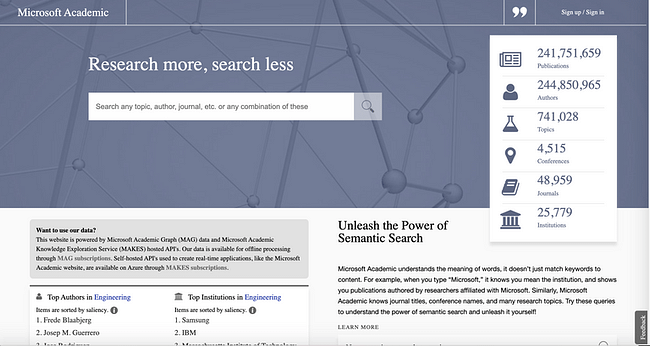
Microsoft Academic is another comprehensive research tool featuring a search engine serving up content from over 120 million publications, including scientific papers, conferences and journals. Searches can be conducted by topic or fields of study.
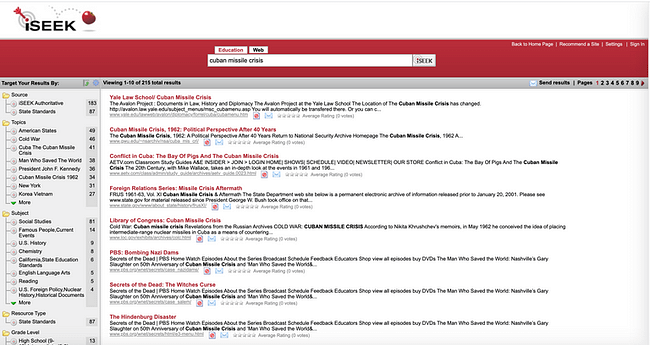
iSeek is a scholastic search engine for where you can ask a question or enter in a topic. iSEEK pulls its information from trusted resources from universities, government and established non-commercial sites. Once you enter your question or topic, iSEEK returns results that can be drilled down even more by topic, subject, people, places, organizations and more.
4. Library of Congress

People don't usually think of The Library of Congress when thinking of research resources, but it is considered the largest library in the world with millions of books, recordings, photographs, newspapers, maps and manuscripts. The website offers research guides, digital collections and an online ask a librarian feature.
5. Internet Public Library
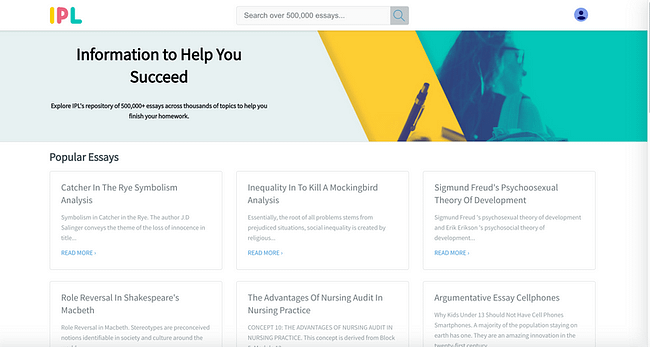
The Internet Public Library is a public, web-based library encompassing a variety of resources, organized by subject area. This online library catalog contains essays on a variety of subjects - European History, Genetic Engineering, Marketing & Religion to name a few. There are even essays on different types of essays - argumentative, personal narrative, persuasive, etc. The website offers additional collections like the POTUS collection on U.S. presidents, Stately Knowledge about U.S. States, plus as a bonus there is an A+ Research & Writing Guide detailing steps for constructing an organized research effort and papers.
6. Digital History
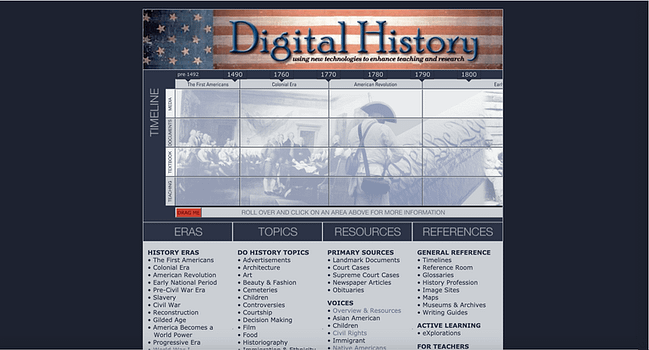
Digital History is a unique website devoted to U.S. History. The website breaks down its content into Eras, Topics, Resources and References. There are exhibitions, multimedia (historical music collections by era) and a section titled Voices, which contains historical writings and speeches. You can view an interview with Rosa Parks and the manuscript for the famous "I Have a Dream" speech from Martin Luther King, Jr.
7. Artcyclopedia
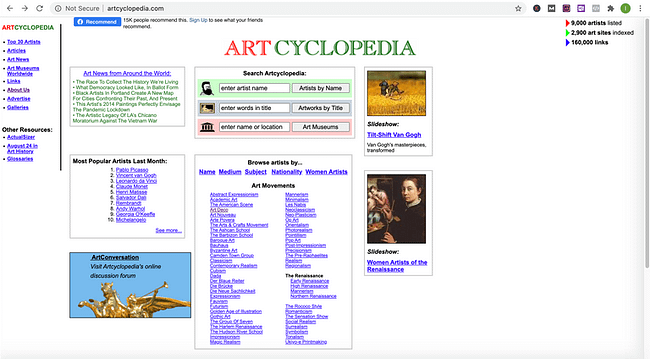
Artcyclopedia is a really unusual search engine devoted to artists and works of art. You can search by artist name, artworks by title or art museums. The site lists the most popular artists by month and allows you to browse artists by medium, subject and nationality. There is also a section devoted to art movements, i.e. Art Deco, Neoclassicism, Cubism, etc.
8. BioMedCentral
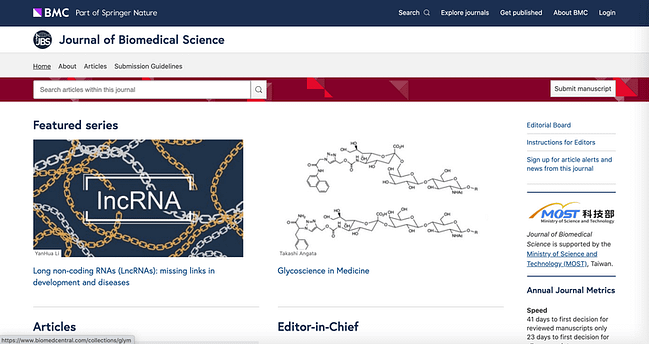
According to the BioMedCentral website, it has an evolving portfolio of some 300 peer-reviewed journals, sharing discoveries from research communities in science, technology, engineering and medicine. You can search by topic or view many of the science related journals by subject, i.e. biomedicine, earth sciences, psychology, etc. Each journal article will contain an abstract, background, main text, conclusion and references. Some article will contain methodology and results with diagrams and images and downloadable citations.
9. Infoplease
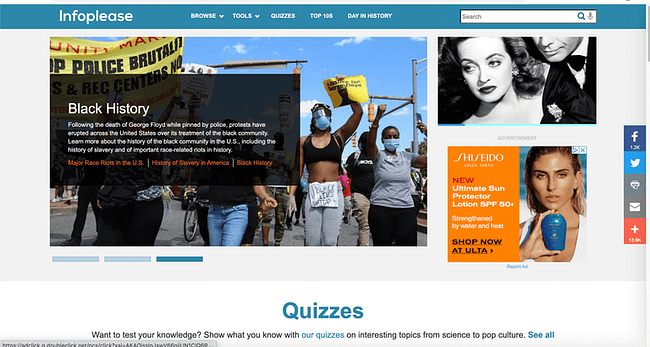
Infoplease is a reference and learning site, combining the contents of an encyclopedia, a dictionary, an atlas and several almanacs loaded with statistics, facts, and historical records. While it is an open access site, there are professional editors who manage and update the content. There are sections on World, U.S., Math & Science, People, History and Business. In addition to its popular country profiles, the website also features an Ask the Editor section.
10. Scholarpedia
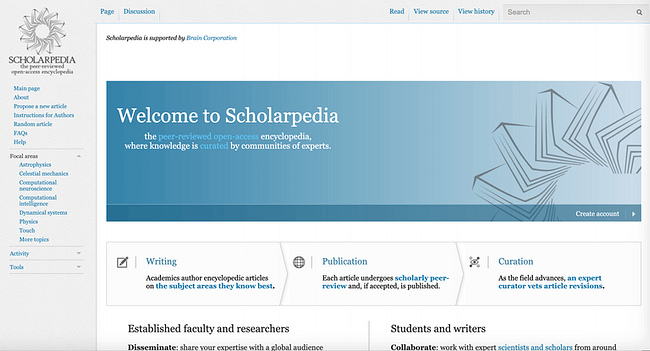
Scholarpedia is an open access encyclopedia where the information is curated by communities of scholarly experts. Academic authors have to submit their articles for a scholarly peer review, and if accepted will be published on the site. Scholarpedia is definitely focused on more STEM related topics. There are in-depth articles devoted to applied mathematics, quantum physics, neuroscience and more.
11. Refseek
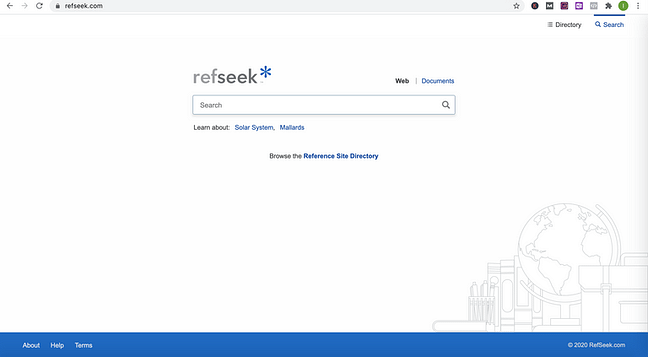
Refseek resembles a typical Google search except that the results returned are more academic in nature. According to Refseek, the search engine searches more than five billion documents, including web pages, books, encyclopedias, journals, and newspapers. While searches do return results containing ads at the top of the page, they are minimal and a quick scroll down offers numerous academic-worthy results. There is also a feature to search by documents, which will return PDF documents helpful for your research and source citations.
12. Wolfram Alpha
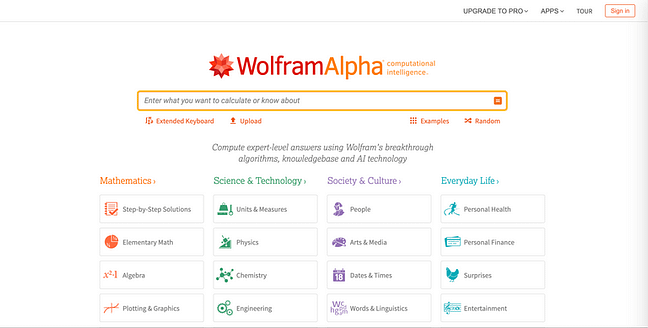
Wolfram Alpha is much more than a search engine, it is more like an answer engine. Wolfram Alpha uses algorithms, knowledge base and artificial intelligence technology to serve up detailed answers to questions and topics. Very popular among math students - it will show step-by-step solutions to math, chemistry and physics topics - the site is also useful to research a wide variety of topics related to science and technology, society and culture, and everyday life.
A Good Starting Point for Research
These sites offer a good starting point to begin your research process. For more research-related tips, see our post on citation and bibliography apps.
Photo Credit Head Image: Dan Dimmock on Unsplash
You may also like
7 simple tips to create awesome college care packages, 15 truly unique college graduation gift ideas, receive new posts directly in your inbox.

IMAGES
VIDEO
COMMENTS
Choosing that one idea from plenty of research proposal topics for college students is the foremost step in any academic project. Lack of inspiration? We made an ultimate list of research topics for college students. You will find art, biology, social science, education, and even more fun research topics for college students.
Transitioning from high school to the rigor of college studies can be overwhelming for many students, and finding the best way to study with a new course load can seem like a daunting process. Effective study methods work because they engage multiple ways of learning. As Jessie Schwab, psychologist and preceptor at the Harvard College Writing ...
While exploring the top 10 research topics for students, constructing research may seem difficult - going through the research design - elements and characteristics can solve your problems. So, here are the best research topics for students in college: 1. The impact of AI on artistic creation. 2.
The resource connects college students with life sciences and biomedical academic sources. And as an open-access database, PubMed Central offers free access to scholarly literature. Today, PubMed Central has over 7 million full-text records, making it a great resource for students in the life sciences or medical fields.
The most commonly reported reason is to "stay awake to study" or increase concentration.44 Students may utilize these drugs more than age-matched non-students.45 A survey at 119 colleges and universities across the US found a 6.9% lifetime prevalence for the use of stimulants.46 Other studies show prevalence as high as 14%.44,47 Men are ...
A strong research topic comprises three important qualities: originality, value and feasibility.. Originality - a good topic explores an original area or takes a novel angle on an existing area of study.; Value - a strong research topic provides value and makes a contribution, either academically or practically.; Feasibility - a good research topic needs to be practical and manageable ...
The topics covered are subjects that will help you prepare for college-level research. Each module ends with an assessment to test your knowledge. The JSTOR librarians who helped create the course hope you learn from the experience and feel ready to research when you've finished this program. Select Module 1: Effective Searching to begin the ...
Simple Studies was founded in May 2020 by Sarah Frank in order to combat education inequity, especially in light of virtual learning in the midst of a global pandemic.The idea was, and still is, to provide students with free resources created for and by students. The organization partnered with Hidaku in late 2020 which funded all necessary payments and affiliated the organization with the ...
Jessica Stewart understands from personal experience the value of doing research as a college undergraduate. In her junior year at the University of California, Berkeley, Stewart worked with art ...
According to the BioMedCentral website, it has an evolving portfolio of some 300 peer-reviewed journals, sharing discoveries from research communities in science, technology, engineering and medicine. You can search by topic or view many of the science related journals by subject, i.e. biomedicine, earth sciences, psychology, etc.